#but regardless it is important to learn how to truly navigate those moments rather than just try to ignore or escape
Explore tagged Tumblr posts
Text
I think it’s important to remember that something being hard or challenging doesn’t automatically make it bad. Life becomes a lot more satisfying when you face up to the fact life isn’t always easy or pleasant. You must have strategies that will navigate you through the uncomfortable parts of life.
#I mean sometimes it is just Bad and that’s okay too#but regardless it is important to learn how to truly navigate those moments rather than just try to ignore or escape#through challenge comes growth etc#excellence
14 notes
·
View notes
Text
He Promised, You Trusted.
Part Two to “I Promise, You Trust”
A/N: Reader is between 14-17, so this is a Father Figure!Antonio x Reader. No romance, 100% platonic.
TW: Nothing horribly graphic, some mild angst, but mostly just to lead up to the fluff
Masterlist
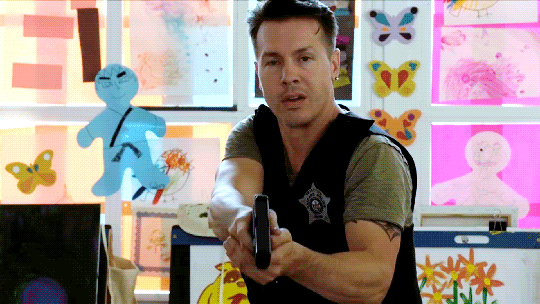
It sure was cold outside. Chicago had been cold, but Minnesota somehow was colder. Your aunt had apologized she couldn't pick you up from school but it wasn't really her fault. She had to pick up some extra shifts to keep up with the bills. You're just glad she let you stay with her. 8 months ago, you really had no idea where you would end up.
8 months ago...
Detective Dawson ran off to make some calls, leaving you to your own thoughts. You noticed the worried glances of his coworkers watching you from the unit floor. You didn’t know any of them, they were all sorta intimidating in their own way, well, except for the woman with brown hair, she looked nice. It just felt better to block them out and focus on the mug in your hands. The hot chocolate had gotten cold in the time it took you to process everything and really you haven’t truly processed anything.
Dawson came back in the room, his face muddled with several emotions. There was some stress, determination and anger but you made out the sympathy on his features most of all. Most people don't want sympathy, but you were just glad someone was caring enough to do so. Trailing behind him was another cop, older, you'd seen him before, just didn't know his name.
"You got anyone we can call?" Antonio asks. you had to wrack your brain a bit. It hadn’t occurred to you that this would be important. "I have an aunt. I haven't talked to her in years. My dad and her don't get along."
The two men exchanged a glance. And you understood now. If you didn't find a home yourself, they'd have to put you in a group home. That was not good. You had heard stories, everyone has. Group homes only provide shelter to trouble. If you ended up there who knows what would happen to you after. You hadn’t thought this through, this was a bad idea. In some sort of a desperate plea, you grab the detective’s hand as he’s about the leave with the other guy.
"Wait no no... I can't live in a home. I can't. I'd rather go home to my dad. Please no." Panic evident in your voice. His face softens, kneeling down to your height. He was just going to try to comfort you. You forced yourself to remember whatever he says can’t change the truth. He isn’t the one making the rules. You’re not naive.
"Hey, hey kiddo. Not there yet, let's give your aunt a ring and see if we can get ahold of her. You got a name?" His voice calm, if he was worried you really couldn’t tell now, unlike when he first returned. You gave her name, not knowing anything besides she lived in St. Paul. But they were cops, you figured they could track her down.
The other guy, Voight, left, you heard him call out to someone named Halstead to run your aunt's name. Antonio didn’t move, just kept holding your hand looking around as if he wasn’t. The fact we seemed unbothered by the comforting gesture put you more at ease, yet you still were struggling with this.
"B-but what if she doesn't want me?"
There was a look of disbelief in his face, as if you were made of solid gold. It was fake and you knew it, still, it was comforting. "We're gonna figure it out, ok? I'll tell her myself what a great kid you are."
"I'm sorry."
The detective didn’t have to say anything, but you knew he deflected your apology. Somehow you just knew the minute you said it what his response was going to be. He didn’t feel bothered. And on top of this it was going to work out. He would make sure it worked out.
And it did. Given the explanation of the situation, your Aunt was happy to take you in. Antonio pulled some strings and you spent one night with his colleague Kim Burgess (the woman with the brown hair) before your aunt took over custody. In less than 48 hours you were on your way to Minnesota with a bag you packed and your dad had no clue. For once you knew there was at least one person who was worth trusting in this world.
The snow crunched below your feet. It was only another mile or so to your aunt’s place. The roads were pretty clear. Much of the snow had been packed down for days, but a recent heatwave melted and refroze the roads to solid ice. The deceiving snow was only an inch or two thick on top of the slick icy layer beneath. So, when you hear tires squeal, it is not in any way surprising. You were learning to drive yourself; ice roads were something that even your aunt had trouble managing let alone teach you how to navigate. You had respect for anyone who was able to successfully manage those roads in two-wheel drive. Whipping around, there’s not a two-ton car sliding towards you as you had expected, planning to dive roll into the snow. There’s a black van with a guy in a ski mask running towards you.
Crap.
Taking advantage of the ice, you threw your backpack at him, hoping he’d lose his balance and walk onto the more slippery road. Yet things do not go to plan as he easily recovers and continues to pursue you, reaching you and wrapping his arms around your waist. You fought. You screamed, wailed, bit, flailed, kicked and every other defensive action your subconscious could think of. It didn’t work, he was just too much bigger than you. You were thrown into the back of the van.
no no no no no this can’t be happening.
You considered yourself a calm person, but that was before you were tied and gagged in the back of a van. The darkness seemed to only escalate your fears as you had a blank canvas to imagine your worst nightmares becoming reality. "Please, just let me go” you must have said it 40 times before something heavy hit your head.
Things faded in and out. Darkness and light fought a battle, but you could never really tell if you could see or not, it was all just shadows. The nausea was also coming in waves, paired with the throbbing sensation on the back of your head. You had been pistol whipped. But of course, you didn’t know that. The sheer terror of the entire situation still had you disoriented. You couldn’t feel the time pass, most people know what a minute or five minutes feels like, but you couldn’t focus. It was all too much.
When the van doors slide open you hear the guy who grabbed you talk to whoever was driving. “I still can’t believe this guy.” His gruff voice scoffed, close by.
“Well, he had the money, who are we to judge.”
“Guy? Had someone hired them to take me? Was I about to be sold or something?”
You’re embarrassed to say the next voice you heard brought you half a millisecond of comfort, it was misplaced. “You had to put a sack over her head?” It was your dad. How? Better question why would he ask that question though he had no emotion in his voice.
The men and your dad talk as you wrestle with this entire shock. Suddenly someone picks you up and carries you over their shoulder. You figured it was guy who grabbed you, but feeling that whoever was holding you gently lowered you to the floor, you made the new assumption it was your dad. The blindfold and gag came off in a quick motion. You were met with the hollow face of your father in some sort of abandoned room. He gave a sickening smile, one that brought no relief with it. “I brought you back sugar!”
“Dad, let me go.”
He nodded and started to undo your restraints. It couldn’t be this easy. Taking a moment, he was preoccupied with removing the duct tape glue from your arms, as if he cared, you jumped up, running across the room to open the metal door, but it was locked.
“Open the door, dad.”
“Y-you’ll just leave.” He whimpered, face looking offended.
This wasn’t your dad. The eyes were too hopeful and the demeanor was too caring. This was you dad having some sort of a mental breakdown. The pieces came together as you watched the tremors in his hands. Not knowing the man in front of you felt more terrifying than the man you ran away from. Before, you knew somewhere buried deep in his subconscious he would never seriously harm you beyond some bruises. But you stared into eyes you didn’t recognize. It was entirely possible he was going to kill you. All of that mess 8 months ago just to end up dying in Chicago and nobody knows about it.
But that’s where you were wrong.
Within a 25 mile radius…
“Detective Dawson,”
The somewhat uncaring police deputy at St. Paul started running down the situation. There wasn’t much to tell. Your backpack was found in a snowbank near some blood in the snow with you nowhere to be found. Your aunt had been adamant that the deputy at the front desk reach Antonio. And of course, the detective roped his unit into the situation. Voight made it a priority. It didn’t take a psychologist to see that Antonio cared about you, he cared about all his teen CIs. They were his secondary kids. He would find you, even if he hadn’t promised you to do so. He promised himself. When word had come in that your dad had been behind the entire situation it was not much of a shock. A man with a past of petty crime and domestic abuse with mental health concerns did seem like a high probability suspect. He had also rented out a storage container on the industrial side of town. Antonio and his team suited up. He was going to end this situation here and now.
“CHICAGO PD OPEN THE DOOR”
In a frenzied craze, your father throws you to the floor. It would make sense for him to run, but logic wasn’t a key factor right now. His foot goes to your neck and the gun points to your head. The gun must have been on his back, you hadn’t seen it until now.
I don’t want to die.
Not like this.
Not here.
Please no.
Please.
Bursting through the door you make out several people with weapons drawn on your dad. Light floods the dark room leaving the two of you partially blind, yet the tension still filled the air.
“LET HER GO.” It wasn’t a request. It was an order. Regardless, your neck was still being crushed. Air was slowly waning from your lungs. And then it wasn’t. In an instant you felt his foot roll out from over you, giving you a chance to scramble away.
“Y/N, Y/N, it’s ok. We’re police.”
And that was likely the only time anyone from your side of town was happy to hear that phrase. But still, you couldn’t quite comprehend it. It was a full mess of tears, screaming, wailing and shaking. You had been mere seconds from death by gun or choking, you couldn’t just suck it up. Not even you were that badass. Nonetheless, the cops weren’t getting anywhere with calming you down.
“Call an ambo.” Calls another voice, a woman. “Tonio, you ok?”
“Yeah” And under normal circumstances you would have connected the dots, but as it has already been overly reiterated, you were not stable right now. The only thing you could register was the familiar hand on top of yours gently squeezing your arm below.
“Shhh shhh, it’s ok kiddo, we got you. He’s gone.”
Hold it, you know that voice.
And what would you know, you finally grasped it. Staring down at you is Detective Dawson, once again saving your neck, literally. It was probably against some rule, but you just buried your head in his shoulder trying to block out everything outside. He let it slide, just holding you there, seemingly not in any rush to move you till the paramedics arrived. In time you realized the other officer trying to calm you down had been Burgess, but you just hadn’t recognized her. You’re in pain, but not horrendous amounts, must be the adrenaline. Regardless, Antonio calls another officer, Atwater, to carry you outside to the ambulance. Before you know it, the ambo is driving away from the scene to Chicago Med, leaving the Intelligence Unit to deal with the aftermath including Dawson.
Sitting in the ER, you wait for test results to return on your head scan. More had happened in the last 12 hours than in the last 8 months. You realized how much you liked the simplicity and (relative) safety of Minnesota, but now you’d at least carry pepper spray. You’re pulled from your thoughts as you see Dawson peak from the side of the curtains. You had not felt too lonely or afraid before given the officers stationed outside your room, but seeing him made you feel better.
“Hey kiddo, how’s the neck?” he smiles, moving into the room slowly as if he was trying not to scare you.
You smile weakly, still exhausted. “Alright, considering.” You noticed tape on the base of his neck on one side extending underneath his shirt where you couldn’t see. “What happened?”
“I might be getting a little long in the tooth for tackling suspects.” And by suspects, you knew he meant your dad. He was the one who got him off you. “Are you ok?” You ask. “All good, just had to get my shoulder checked out.”
“Ok, glad you’re ok.” And you truly were. You would feel awful if you had been the reason he had been seriously injured, especially after you were supposed to be out of his hair.
He nods, fiddling with his hands on the rail at the end of your bed. “Hey, your aunt is on her way to get you, it’s gonna be awhile, but I talked to your doctor and they said they’ll keep you till she arrives to monitor your concussion.”
You nod. “My dad?”
“We got him, he’s going away for a long time.” You notice his lack of enthusiasm in that response, obviously thinking that justice had not been fully served.
“But not forever.” Your voice soft, barely over a whisper.
He shook his head. “Long enough you’re not going to need to worry about him.”
“But you’ll come rescue me again if he tries, right?” You cocked an eyebrow, knowing it wasn’t a promise he could make, but every reassuring thing he told you made you feel better anyways.
“As much as I love the job, I don’t know if I’m going to be on the force in 40 years.”
“Yeah, you might not be able to a shoot a gun while using a walker with tennis balls on the bottom.” The two of you laugh a bit at that visualization.
As you quiet down you notice he looks a bit more serious.“But yeah, I’ll get you.”
Once again, probably against some protocol, but you just had to reach out and hug him burying your face in his leather jacket. He leans forward to pull you in. Something about it was just natural, you knew he’d protect you, you knew that now.
“Thank you so much. I’d be dead.”
“Of course,” He pets your hair, resting his chin on the top of your head.
“T-thank you for caring.” He pulls back to look you in the eyes.
“I checked your record, no priors since you left. Thank you for being worth it.” He smiles.
The two of you sit there for a minute, staring at each other, his hand still the (good) side of your head. You’d never really had a dad moment like this, but if this was the first and last dad moment you ever had, you were ok with it. It was perfect. He stands up, stretching out his back as if he’s about to leave. But instead, he pulls up a chair.
“You don’t mind if I stick around till your aunt arrives do you?”
You gently shook your head. Truth was, you were too afraid to ask him to do so, but of course, somehow, he knew what you needed. So there the two of you sat. Talking about the extremely normal things you had been involved in back in Minnesota. You swear he kept a small smile on his face the entire time. Just happy to see you moving on. It was done.
When you turned 18, you reached out the Antonio again and asked if he would be willing to meet up for lunch, now that it was “legal” to do so. And now it has become an annual event with occasional bonus trips when you somehow wind up in the Windy City. Your lives may have grown apart in distance but something would always keep the two of you together. He’d always be there for you, and you needed that. Maybe not everyone needs a perfect father figure to survive in the world, but knowing a tough boxing detective would be by your side in one phone call gave you the freedom of safety. Your aunt is an amazing woman, but Antonio Dawson is really the one who you owe everything to.
He promised, you trusted, and it was the first decision of your life that truly mattered.
A/N: I know my presence on this account is sporadic, but I hope some people enjoy this. I’m going to dive into my drafts to work on some of the partially written responses I have for some old requests. (:
#antonio dawson#antonio dawson x reader#Chicago PD#one chicago#antonio dawson imagines#antonio dawson imagine#antonio dawson baby#fanfiction#fandom#fanfic
168 notes
·
View notes
Text
What do you want, Adora??
Why does this line from She-Ra destroy me? Like it hits so hard and I feel like it’s because it’s such a simple question, but Adora has never once seemed to have thought about the answer. What does this say about her? What are the writers trying to show through her struggle to consider the answer to this question?
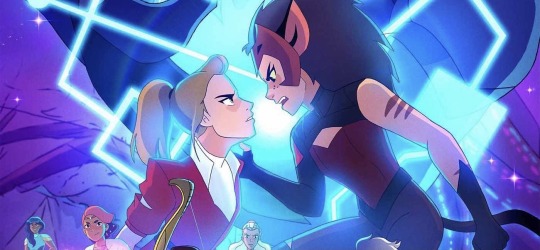
I think the show really interestingly explores it by deconstructing the concepts of selfishness and selfless, especially when in relation to individual wants/desires and self-care.
There is definitely a spectrum at play with these principles. On one end, you have complete selfishness. Other people’s feelings aren’t important. You must do what you need to do to make yourself happy. This might be self-care (because you are getting what you want), but it’s also making a negative impact on others and therefore, is selfish and damaging.
On the other end, there is complete selflessness. This is putting everyone else’s needs before your own and not engaging in self-care at all because any type of behavior that is done at the individual level feels selfish. However, although this seems morally upstanding, it can be ultimately harmful to the self at an individual level.
This is why the best types of self-care strike a balance between what a person needs at an individual level and how these wants may impact other people as well. It’s not on either side of the spectrum, but rather, at an undefined, malleable point somewhere in the middle.
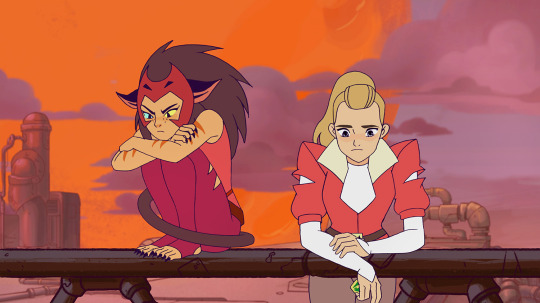
And She-Ra explores this idea in the same way that it does with most other ones: through Catra and Adora’s character arcs.
In the beginning, many of Catra’s actions are selfish. That is not to say that she is irredeemable- she was an abused child, so she finds that the only way for her to get control and love is through acting seflishly. In other words, she thinks she needs to take what she wants because no one was ever considerate of her so in order to be happy, she can’t care about what happens to them either (this is a warped world view but regardless...)
Think about Adora’s decision to leave the Horde through Catra’s eyes. To her, this was selfish. Adora left to get new friends and new powers, but didn’t take into account how it would affect Catra (which may not be true, but it’s accurate to Catra). Therefore, she decides to pursue her own desires in a similar way. She wants the Horde to win to defeat Adora, regardless of the morally problematic nature of the Horde. She opens the portal to live happily with Adora without thinking about how it literally could have ended the world!! These are all exceedingly selfish actions that Catra performs because she just wants to be happy, stop hurting, and win for once. And she doesn’t care who she hurts along the way.

Until the guilt comes.
After the portal, Catra is finally confronted with the effects of her selfishness- and eventually, is forced to see that her actions are not a type of self-care or ambition, but in fact, just selfish. And have been constantly damaging her relationships throughout the series as well (namely those with Adora, Scorpia, and Entrapta).
Catra was much too far on the one end of the scale, exploring the consequences of selfishness and how it damages interpersonal connection.
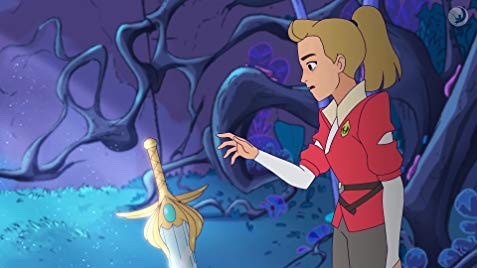
On the other hand, Adora deals with the exact opposite. Throughout the series, it becomes clear that Adora never does anything for herself. She sacrifices her own wants and needs to do what is right for the world and will help the most people (this often has to do with her duty as She-Ra).
This distinction isn’t super problematic in the beginning because Adora’s wants often align with what the world needs. She wants to defeat the Horde and her duty is to do so, etc.
However, whenever she is really confronted (emotionally speaking) by Catra, this is when the two paths split. Adora never wants to hurt Catra, she shows her mercy, even when it’s not the best strategic move, and even after Catra opens the portal, Adora refuses to leave her behind, even though the world really just needs her to forget about Catra and shut the portal down.
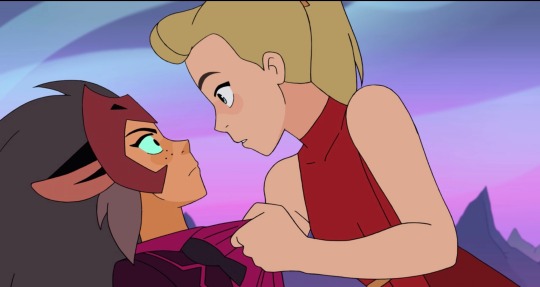
This distinction is further exacerbated after Catra redeems herself- because now, Adora is confronted more and more by the difference between what she wants (to be with Catra and keep her safe) and what everyone else needs (for Adora to let go of Catra and fulfill her duty as She-Ra).
As Shadow Weaver puts it, Catra is a distraction to Adora- one that is preventing her from being able to help the others around her. It doesn’t matter what Adora wants. She has a higher duty.
In this way, Adora does not think that she is allowed to care about herself. Others must always come first. To her, allowing herself to love Catra is selfish because it does not take into account all of the people that Adora is responsible for (all of Etheria is counting on her). And having to constantly forget herself and be deprived of what she actually wants deeply damages Adora- because she doesn’t think that she deserves to be happy on an individual level- even though everyone needs some sort of self-care or happiness in their lives. Adora needs Catra. It is not selfish for her to want love. But Adora isn’t able to see that (especially with all the pressure surrounding her duty as She-Ra), and she suffers. And this suffering is actually what prevents her from turning into She-Ra, not her selfishness or distraction.
This is why Adora is on the exact other end of the spectrum as Catra. She is much too selfless, which causes her to be unhappy on a personal level. And this inhibits her from positively impacting others. Therefore, it’s not actually more responsible to be selfless- it can have a negative impact, just as selfishness can.
But as the show continues on, both Catra and Adora drift further and further into the middle area.
Catra is first. After finally seeing how destructive selfishness can be (it literally destroyed ALL of her relationships), Catra sees that taking into account other people is not weakness, but rather, vital to caring for yourself too.
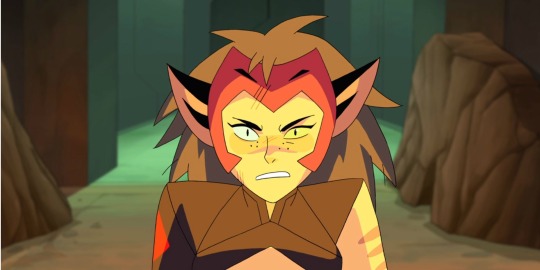
Take Catra’s apology to Adora in Corridors, for example. This is a moment where Catra does something that is truly not motivated by her own desires. It is not selfish. It’s a sacrifice- she gives herself up, expecting nothing in return, and ultimately hoping Adora can finally be happy. She doesn’t care what happens to her anymore.
This moment was huge because she finally drifts back into the middle of this scale and does something that will benefit the world as a whole, rather than fulfilling her selfish desires.
However, this move is actually a bit of an overcorrection, which is important. Catra doesn’t know how to be both considerate of others and loving towards herself. She goes straight to the other side of the spectrum (to selfishness), giving up her own autonomy and freedom and fully believing that she is worthless and does not deserve to get anything she wants (because she’s hurt so many people). It makes sense why Catra would think this, but again, the show smartly combats this ideal.
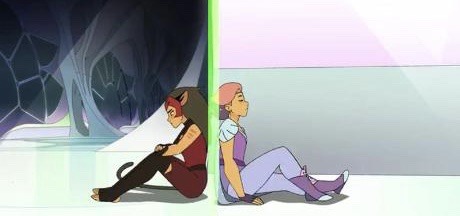
Although this moment could have been Catra’s hero moment, and her sacrifice could have just ended there, having Adora go back for her, forgive her, and remind her that she does have worth and she does deserve love, displays that Catra’s decision was actually not the final answer because it didn’t involve Catra learning to love herself.
Adora’s loyalty and love shows Catra that she does not need to overcorrect and be a selfless sacrificial pawn to save everyone else. She is allowed to still have wants and desires, just as long as she doesn’t hurt other people on the road to them (ironically, this is the exact lesson that Adora needs to learn too).
And as Catra slowly apologizes for everything she’s done and redeems herself, she finally starts to really learn how to navigate selfishness and live comfortably in the middle area. After some struggles with it (Catra leaving Adora because she feels like she’s in the way), Catra’s entire journey culminates in her final decision to stay with Adora and ultimately, to confess her love for her.
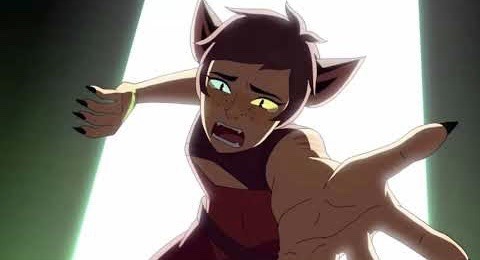
Even though she was told her love was a distraction for Adora and they both thought they wouldn’t have time for it (the world was basically ending), she decides that they both deserve it and are allowed to want it. This is HUGE. This is Catra’s hero moment (Noelle has even said this!), because even though at the climax of this huge world-wide conflict, she allows Adora to attempt to save the world (even though she may die), which displays her being considerate of Adora’s responsibility to save everyone, eventually SHE DRAWS THE LINE while watching Adora die. She will not let her go. They both deserve to survive and get what they want: love.
Adora goes through has a similar journey. As the finale approaches, she feels an immense pressure to be the selfless hero that she’s supposed to be (like Mara was), but both Catra and Mara challenge that ideal, asking Adora what it is that she personally wants. But she doesn’t think she’s allowed to want anything.
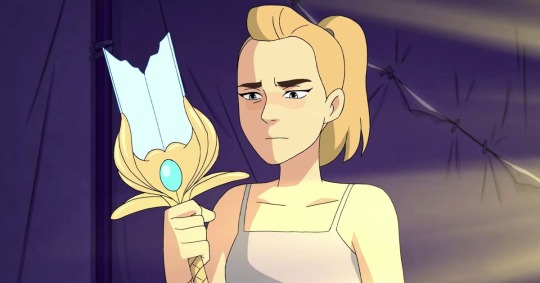
Adora is also having trouble transforming and she thinks it’s because she’s not being selfless enough, but it’s actually the opposite. Once Catra leaves her, she glitches because she feels unfulfilled and heartbroken that she’ll never get to be with Catra.
And in her final hero moment, when she can’t transform into She-Ra and she starts dying, we’re given a literal representation of Adora’s individual desires through the dream: she just wants love (from Catra and from Glimmer and Bow).
So when Catra comes through into her vision, confessing her love, Adora thinks that she’s going to die and she knows she’s done all she can for the revolution (she literally can’t help anymore). So she finally has a MOMENT to think about what she actually wants.
And she wants to be with Catra. She wants to love her and be loved by her. So she confesses her love back.
And then transforms.
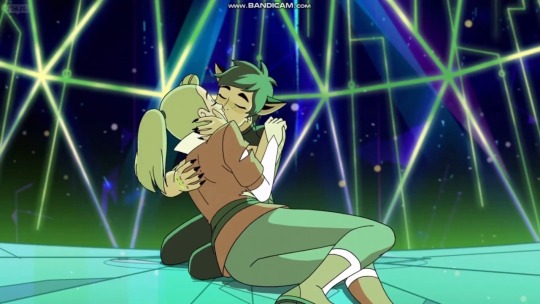
Her want for love on a personal level wasn’t a distraction. In fact, it was the solution.
This is the middle area, where they’re supposed to be. Which is why this love is so powerful, and why it helps Adora transform and save everyone anyway.
Finally, the message becomes resoundingly clear: People who don’t care about themselves aren’t healthy. Being selfless isn’t the ultimate goal. People who care about themselves as much as they care about others are actually much more powerful than the ones that are deprived of self care and love. This is why Adora is able to save everyone- because she cares for herself first.
What a rare message for a chosen one-type story. The hero is encouraged to think about what they want on a personal level- and use the happiness they get from their fulfillment to become an even better hero.
Overall, the show takes the time to really tease apart how harmful both selfishness and selflessness can be. It displays to viewers the important lesson that engaging in self-care is okay (often, it’s extremely vital) and as long as you consider the feelings of others as well, you will become the best version of yourself possible- regardless of whether you’re an 8ft tall warrior woman, who can then restore balance to the world or a reformed villain, who can finally overcome self-hatred and both give and receive love as a result.
#I don't know what I want either Adora nw#spop catra#spop adora#she ra spop#she ra#she ra catra#she ra catradora
12 notes
·
View notes
Text
Why INFPs May Stay in Bad Relationships (and How to Get Out)
In life, heartbreak is inevitable, at least at some point. What is preventable, though, is staying in a relationship that doesn’t resonate with you and doesn’t make you truly happy.
I’ve had my fair share of relationships and modern dating. It’s tough. It’s fun. It can be beautiful — but it can also hurt very deeply, especially for people who feel as much as INFPs do.
As an INFP who has stayed in a few toxic relationships for too long, here are some lessons I’ve learned the hard way.
We See the Best in People (Sometimes an Imaginary Best)
I once read a quote that said: “Never fall in love with someone’s potential, because you could be falling in love with someone they’ll never be.” For INFPs and others like us, this is a huge danger zone.
INFPs are idealists. We see future possibilities rather than present realities. When we meet someone — and we feel a connection — it can be immensely difficult for us to take them at face value. We think about them in great detail, potentially filling in gaps of character knowledge with what we would like them to be, and daydreaming about what we could do together in the near (and even distant) future.
We can become so immersed in who we think this person is, and who we want them to be, that we may ignore incongruities in this person’s character. I think this stems from the fact that we believe all people are inherently good — I still believe this, even after two toxic relationships. However, some people’s intentions are not so honest.
I have an unfortunate, perhaps cliched habit of going for bad boys. Maybe it’s part of being the “healer” personality, but I am your typical “fixer.” It’s sweet in theory, but it’s detrimental to my own wellbeing.
I have been guilty of staying in relationships that are not right for me because I saw the imaginary best in a person — clinging to our best moments and ignoring huge, waving red flags. For example: lying, poor communication, drug abuse, narcissism, even infidelity.
We May Accept Others to the Point That We Neglect Our Own Needs (Then Blow Up)
This leads swimmingly to my next lesson. Many INFPs believe in the concept of “live and let live.” This can make us great, understanding partners, but what happens when the person we’re with doesn’t treat us how we want and need to be treated?
We hate conflict, so that’s usually a painful no-go. Then there’s swallowing our emotions and trudging along while not feeling truly happy. I’m sure we’ve all done this at some point, regardless of our Myers-Briggs personality type. My best friend — an ESFJ — used to say that I was “a passive acceptor of torment” about my relationship with my ex-boyfriend. He did things that — when I look back — simply made me sad: messaging other women, lying, poor communication.
These things made me feel hurt and uncomfortable. But, rather than own the fact that they made me uneasy, I instead tried to push my feelings to the side, thinking I was overreacting or being needy.
I was so accepting of who he was as a person that I excused behavior that didn’t sit right with me, and stayed in a relationship that made me sad for far too long. I overanalyzed and ruminated, trying to understand his side, and let his behavior be okay with me.
But then, every little incident would feel like a tiny increase on the thermometer, until suddenly I reached my boiling point and blew up. Of course, he thought I was acting “crazy,” completely unaware of all the slights along the way that had led to this point.
If You’re in a Relationship That Makes You Uneasy, Don’t Ignore That Feeling
Both traits tie together in a way: We see what we want to see, and we accept and try to empathize with what hurts us. This is why I’ve stayed in bad relationships, despite anxiety and unhappiness.
What I have started doing is listening more to my gut. INFPs have very strong belief systems that we use to navigate the world. However, when love comes into play, our internal compasses may go askew, and we might even stop listening to our instincts.
In past bad relationships, I felt completely, totally anxious. There were highs of immense fun, but my baseline was unsettled. I felt drained, I overthought a lot, and I wasn’t happy. But I ignored those feelings and continued to hope for the best.
Some things I used to say to myself:
“It’s just the way they are. I need to relax.” (I never felt relaxed.)
“It’s just me — I’m sensitive and asking for too much.” (Why did I put my needs in the backseat?)
“I should not have said that, now they are mad at me.” (But they weren’t making me happy in the first place!)
The things I said to myself simply caused more pain. They stopped me from saying how I felt to my significant other — a person who wasn’t a good match for me regardless — and kept me in the bad relationship when I should have ended it.
Moving Forward: Create the Life You Want to Live
At the end of the day, INFPs are dreamers. We have colorful visions and idealistic dreams of the life we want to live. We’re at our happiest when our imagination is powering us forward and enriching our real lives.
When I finally left my ex, it’s because I had been working on using my dreams and imagination to supercharge my life. I started focusing on myself and boosting my self-confidence. As I did this, the idealistic halo I had unintentionally placed on my ex’s head fell off, and I realized the way he was treating me and his opposing values weren’t what I wanted.
If you’re an INFP who thinks you might be in a bad relationship, it’s time to take action. First, I would recommend trying to view your partner without the rose-tinted spectacles we INFPs so readily wear. This can be tricky, I know, but it’s important to take stock of the realities of your situation (and not pen your hopes of what could be).
Some things to consider:
Does my partner make me feel safe and comfortable to be myself?
Do I trust them?
Do my partner’s actions truly match their words?
If you answered no to one or more of the above questions, then you might be in a situation where your idealism (which you must remember is a wonderful gift, but one that must be channeled and nurtured) is blocking your view of reality. Look into yourself and ask, “Am I really in love with this person — as they are, right now? Am I happy with how they treat me, or am I holding onto the idea of what could be?”
I can’t tell you to leave a relationship — it isn’t my place. But I do want you to be aware of your idealism, and make sure it doesn’t pull the wool over your eyes. Self-esteem and confidence also play a huge role. Listen to your inner dreams and pursue them in actuality. This can go a long way to keep INFPs grounded in reality.
Once you can see your partner without an idealistic halo, you’ll know within yourself what the best next step should be — be it a conversation, some inner work on self-esteem, or perhaps even ending the relationship for good.
Remember, relationships should feel like blessings, not curses. The bottom line is, in a healthy relationship, your baseline feeling shouldn’t be stress. Of course, no relationship is perfect, but stress should not be the predominant emotion.
Why be with a partner who brings out the worst in you? Who makes you feel like your intuition is off kilter? Who makes you feel like you are asking for too much, when all you want is to give and receive love?
INFP, you deserve the love you so freely give to others.
Source: Olivia Berkley, IntrovertDear
#olivia berkley#infp#introvertdear#infp quotes#infp thoughts#infp personality#infp advice#infp problems#infp things#infp traits
73 notes
·
View notes
Text
MLQC Fanfic: Hearts of Storm - Ch 1 - A New Mission
WARNING: NSFW/18+ fic. No smut in this chapter, but eventual smut, dub/non-con, eventual 3P, spoilers, long dragged out fic and angst. Not morally correct. Turn away if this is not your thing. Pairing: Shaw x MC, Gavin x MC, Shaw x MC x Gavin AO3 Link: [here] Summary: Thrust into a world where her friends no longer remembered her, Yui must navigate the familiar yet foreign Loveland City while she battles her sorrows of not having Gavin by her side. As the only person who remembers her, the bratty Shaw forced his way into her heart, becoming the light in her seemingly endless darkness. But when Gavin regains his memories of her, how must she face him with her newfound feelings for Shaw? Will things returning to normal thrust her life into even more chaos? Notes: [See full notes on AO3] Special thanks to Lutz, Sonicaj and Kinako for beta-ing. EXTREME SPOILER ALERT. Follows some canon events, but order and duration are changed and rearranged.

She followed him again today. Yui had been abusing her premonition evol these days, making accidental brushes against strangers whenever she can.
She would bump into as many passengers on the bus as she could without causing a scene, brushed her hand against the coffee shop staff as he handed her the coffee, even went out of her way to pet every dog in the park that would allow her to do so without biting her hand off.
She was being obsessive, she knew that. But that was the only way.
The only way she could try to catch a glimpse of him. Of her Gavin.
Each and every time she touched someone, there was a chance for her to see a vision. And for every vision she saw, there was a chance for it to involve the military.
And every time the military was involved, there was a chance that Gavin would be there, so she could go and try to catch a glimpse of him.
She didn't care if what she was doing was unethical, if every single vision she saw weighed on her soul, if arriving at every single possible incident meant risking her life. If she could see him, even for one single second, it would be worth it, even if he never saw her.
In fact, it was probably better if he never saw her. Otherwise, he would definitely have suspected her of being a spy again and he would have treated her the way he did last time.
She couldn't forget how cold his eyes were the last time they met, when he shoved her against the wall and placed those handcuffs on her. She could still remember the feeling of those cold metal digging into the delicate flesh on her skin.
She had never seen him look at her with so little trust in his eyes. Not when he was helping her reach the poetry volumes on the tall library bookshelves during high school and definitely not after they reunited when he transferred back to Loveland City as a police officer.
So, yes. It was for the best that he did not see her. At least that way, she could still imagine.
Imagine nothing had changed. Imagine he was only out on one of those missions where he could not contact her. Imagine that he would show up at her window some time tonight, asking her if she wants to go stargazing with him.
But she knew this illusion wouldn't last long. So far, her visions had only been of sightings of military investigations and other successful operations. But she knew that sooner or later she would see something bad, something preventable and she would have to try to intervene.
And then, she would have to stare into those cold distrustful eyes again. She would be forced to face reality.
The reality of Gavin no longer being hers. The reality of Gavin not knowing her as if she never existed in this dimension.
It hurt to remember how he questioned her intentions towards him. It hurt to tell him that he was her senpai and he barely believed her.
So she tried to forget reality, tried to imagine they were still living in their original dimension, where his eyes lit up every time he saw her. Where he touched her with so much gentleness that it made her want to cry. Where he would blush every time she mustered up the courage to tell him how much she loved him.
She knew she was being willfully in denial, but if that could stop the hurt in her chest for just one minute, she would gladly do so.
Yui turned her head up to the sky as she heard the sound of the blade of a helicopter closing in. Her hands pressed against the shop window of the cafe where she had been sitting in for the last three hours, waiting for this very moment.
As the noise grew louder and louder, the military chopper came into view. She held her breath, eyes glued to it as it hovered over the park a block away from the coffee shop.
The door slid open and a tall figure in dark military uniform came into view. His brown hair flying every which direction as the strong wind blew around him.
She watched as he quickly surveyed the ground, preparing to jump out of the helicopter.
Yui opened her mouth to silently mutter, "You look well today. Stay safe, Gavin. I miss you." And for that brief moment, her heart stopped aching.
He was gone from her line of sight the next moment, having jumped out and began to fly towards his destination.
She sat back in her chair, closed her eyes and convinced herself that was enough. Enough to support her through the next few days or weeks without spiraling into the endless abyss in her mind that was constantly threatening to drag her in ever since she came to this dimension.
She could now function until the next time she saw him again. And she was determined to function through this. Too much was at stake otherwise.
Black Swan was still scheming to turn everyone into an evolver, while non-evolvers were banding together to wage war against those with evol abilities.
She could not afford to sit back and wither away while watching the world fall apart. She had come too far to give up now, regardless of how much she wanted to curl up in a ball at the loss of everything and everyone important in her life.
It was the least she could do, when Gavin worked so hard to protect everyone, whether in this dimension or the last.
The buzzing sound of her phone brought her back from her thoughts.
"Hello, Shaw." She answered the phone without even glancing at the caller ID. After all, there was only one person left in this world now who would call her.
"You got the file?" Shaw yelled over the phone, the background noisy as usual.
Yui plugged one ear with a finger and pressed the phone closer to her other while turning up the volume. He must be at Live House with a live concert going on. She could hear loud music playing in the background and people cheering. Before she met Shaw, she always thought these live shows only played at night, but she was wrong. Apparently, they played whenever they wanted to.
"Yes. Where do you need me to go this time?" She asked with a voice loud enough for him to hear, but quiet enough that people from the cafe wouldn't be disturbed.
"Getting efficient, huh?" He said with a voice that was obvious he was smirking on the other side. "The amusement park."
She froze. She was ready to work, to gather intel for Shaw, hoping it would get her mind off of her current situation, even for a tiny little bit. But she didn't expect it to be at the amusement park of all places.
"What? Cat got your tongue?" He asked when she didn't reply.
"Does it…" She hesitated, not wanting to give Shaw the opportunity to learn more of her weakness, but she didn't know if she had it in her to go there. "Does it have to be the amusement park?"
"You think intel goes wherever you want it to go?"
She clutched her fist and sighed. He was right. The file he sent clearly indicated that someone was planning an attack. If SHAW said she could gather information at that location to prevent it, the suspects must have left a trail there and not somewhere else. After all, SHAW had never pointed her to the wrong location yet.
But she'd rather go anywhere but there. Send her to the headquarters of Black Swan for all she cared, just not the amusement park.
"Fine. You got me interested. What don't you like about the amusement park?" He usually didn't seem to care about what she does or does not want, but this intrigued him.
"Nevermind. I'll go. I don't want to talk about it." Her voice flat. She didn't want him to ask any further. She would rather face the pain herself than to expose more of her weakness to him. "Besides, you were going to have me go regardless, no?"
"You're no fun." He tutted at her. He paused for a second before resuming with a voice deeper than usual. "I bet it's because of him. You guys probably went on stupid lovey-dovey dates there and so you don't want to go back when he's not with you."
SHAW’s guess was dangerously close to hitting a bull’s eye.
She and Gavin did go on a date at the amusement park, but he was so stupid and so unromantic that he ended up talking on the phone the whole time they were on the Ferris Wheel. She got so upset with him she didn't even want to talk to him. Of course, they made up in the end, but that now-cute memory, as much as it pained her to remember, wasn't the one she was most afraid of reliving.
It was the wedding shoot. Gavin and her stood in for the 100th couple who backed out of the shoot last minute. Although they weren't truly getting married, the memory of her in the wedding gown standing beside Gavin in his blue striped suit, telling each other they were the only ones they ever wanted to be partners with in a wedding whether real or fake was too much for her to bear. It reminded her too much of what might never be if she wasn’t able to fix the situation of her not existing in anyone’s memories in this dimension.
Having to be back at the location that would force her to relive this memory, she wasn't sure if she could keep herself together let alone complete the mission.
But this was private. A memory she wanted to hold so dear that she did not want to discuss with anyone in fear of losing it just like how she lost everything else. It was an irrational fear, of course.
But with so much going on, she felt the need to allow herself to be irrational on this one thing.
She kept her silence, having already said what she wanted to say on the matter.
"Doesn't matter," he finally said, seemingly irritated by her silence. "You start tomorrow."
The line went dead. He hung up on her.
Loud thunder cracked through the air. She jumped at the sound and wondered why the weather was so strange in this dimension. It was a bright sunny day outside.
Yui shook her head and thought of SHAW again.
She didn't understand him. On the outside, he seemed like any other 20 year old little brat, without a care in the world and yet he was doing all these things to gather information and even had Black Swan and evol agents from the STF going after him. He even had connections to make fake identities that would pass most government checks for her. All signs pointed to him being a big player in these schemes everyone seemed to be weaving.
However, his attitude were also too laissez-faire, too chaotic. He wasn't like anyone she had known.
He was a leader, much like Victor, but unlike Victor who always had a clear destination, he may lead you in a wild goose chase for his own amusement.
He played, much like Kiro, but unlike Kiro who was like sunshine and puppies, he plays with you like a cat would a mouse.
He was mysterious, much like Lucien, but unlike Lucien who would always plan five steps ahead in everything, he seemed only to have an end goal in mind, making things up as they unfold.
And he was nothing like Gavin. In fact, other than his eye color, his jawline and the fact that they were both amazing bass players, he was the total opposite of Gavin. Where Gavin was gentle, SHAW was rough. Where Gavin always strive to do the right thing for the greater good, SHAW seemed to only do things for his own benefit.
But it didn’t matter what kind of person SHAW was or what his goals were. In this partnership, Yui and SHAW took what they needed from each other, that was it. Nothing more and nothing less.
Placing her cell phone in her pocket, she gently touched the ginkgo bracelet on her wrist before she stood up and walked out of the coffee shop. As cold air rushed at her face, she adjusted her winter jacket and pulled the hood over her head.
She had one night to steel herself from the emotional onslaught that was sure to come during the next few days. But she had agreed to take on the mission and she would not allow herself to back down or to fail it. She would give it her all, even if it meant ripping the still-open wound in her heart even wider.
Yui stepped forward with stubborn determination in her stride.
#mr love queen's choice#mlqc#mr love fanfic#mlqc fanfic#fanfic#mr love shaw#mlqc shaw#ling xiao#mr love ling xiao#mlqc ling xiao#mr love gavin#mlqc gavin#bai qi#mr love bai qi#mlqc bai qi#love and producer#love and producer gavin#love and producer shaw
25 notes
·
View notes
Text
The Gnostic Circle by Lori Tompkins
“The Gnostic Circle is the most effective method for understanding the transformation of human consciousness. It represents a vision of wholeness and has only one objective: it deals with the soul or seed of the divine in each created thing and reveals the process by which that seed is made to flower in its process of becoming.” – Thea
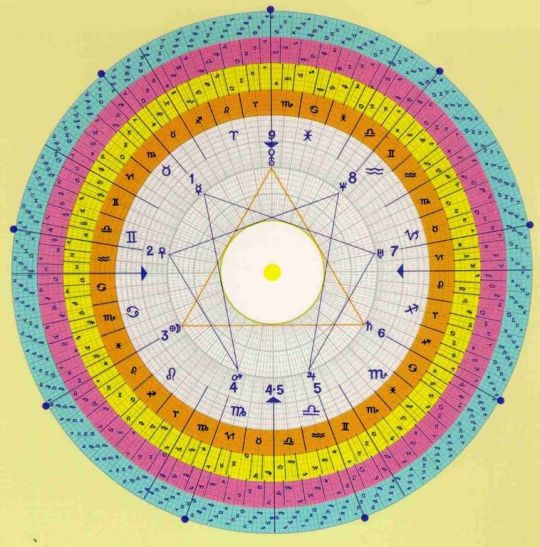
Thea first introduced this key or tool of Supramental Gnosis in her 1975 book, The Gnostic Circle – A Synthesis in the Harmonies of the Cosmos. This key offers the means by which an individual can center him or herself in Time, within the circumstances of both Individual and Collective evolution, and thereby develop an Integral and Supramental vision of the whole. The Gnostic Circle presents the unity-vision of the Vedic Rishis in which the division of the Earth’s 360° year into 12 months and our 0/9 number system/enneagram are seen to function simultaneously rather than as separate systems of measure and knowledge. With this simple vision of the oneness of the zodiac and enneagram, the Gnostic Circle invites viewers to consider how they can begin to outgrow the fragmented consciousness that is the foundation of our current civilisation. The image of the Gnostic Circle presents the supramental or solar consciousness by which all divisions of the circle and all divisions proper to the process of the creation of life, are eternally One.
Using this key, students can begin to restore in themselves and in the world, the eternal gnosis and unity consciousness that underlies many of the world’s ancient sacred texts. It functions in terms of the all-pervasive unity of creation and hence in terms of the self-similarity, self-symmetry and quantum entanglement of micro and macro cycles of time of which the Vedic Rishi were well aware. Thus the 24 hour day, the 360 degree year, the 25,920 year Precession of the Equinoxes and larger cycles of time, can be known and seen as ordered fields of the soul (individual and collective).
In The Synthesis of Yoga, Sri Aurobindo wrote:
‘Time is the remaining aid needed for the effectivity of the process. Time presents itself to human effort as an enemy or a friend, as a resistance, a medium or an instrument. But always it is really the instrument of the soul.’ (The Synthesis of Yoga, CWSA, Vol. 23-24, p. 68)‘The timeless Infinite holds in itself, in its eternal truth of being, beyond this manifestation, all that it manifests in Time. Its time consciousness too is itself infinite and maintains in itself at once in a vision of totalities and of particularities, of mobile succession or moment sight and of total stabilising vision or abiding whole sight what appears to us as the past of things, their present and their future.’ (Ibid, p. 885)
It is here [in the transition from mind to supermind] that a change begins to take place in the time-consciousness and time-knowledge which finds its base and complete reality and significance only on the supramental levels. (Ibid, p. 904)
The Gnostic Circle shows students the truth of Sri Aurobindo’s vision in that they can apply it as an aid or key which helps to shift consciousness (however gradually) from mental towards the supramental. Those who apply this key to their own lives and to world affairs begin to directly experience the supramental consciousness-force that coordinates the whole of our activity, ushering us towards the higher levels of manifestation and self-expression.
In very simple terms, the Gnostic Circle helps the user see and understand the evolutionary march or journey that we all share, regardless of however ignorant we are of this journey. As one learns to see the perfect order and harmony displayed in the smallest details of one’s existence, one begins to identify less with the ego and the mind, and more with the Supramental consciousness which has begun to emerge in our new day and age, just as the Mental consciousness once emerged from the Animal or Vital consciousness in our distant past.
How to Apply this Key of Gnosis
The application of this key for an individual is quite simple. The beginning or zero point of an individual’s life is birth, and from that zero point we journey in time and space. The Gnostic Circle can be used to map out and see the geometries and harmonies that emerge in 1 year cycles, 9 year cycles, 36 year cycles and 72 year cycles or, if one wishes to study larger collective evolutionary movements on our planet, the framework will be larger, such as 2,160 year astrological ages, the 25,920 year Precessional cycle and even vaster cycles of time. Usage of the Gnostic Circle is not limited to the birth of individuals. It can be used to understand the birth or emergence of anything … a country, a pivotal event, a discovery, a new endeavor, etc.
The birth date of the object of one’s study is placed at the zero point at the top of the circle and then, depending on what cycle of time one chooses to explore, we begin to map out pivotal dates according to the major divisions of the circle, identifying the dates associated with the cardinal points, the trinity, and the 12 months.
If looking at the Gnostic Circle in terms of the one year cycle, the outer circle (blue ring) is divided into 360° or segments and each degree represents a day. The last five days of the year are considered ‘out of the calendar’. The Zodiac or division of the year by 12 is seen in the midsection of the circle and each 30° segment is a month. The orange ring contains 36 segments of 10° each and these are decanates of the 12 signs of the zodiac. In the one year journey/cycle, each day we progress 1° of the circle (which in turn is a microcosm of the whole year as well as larger cycles of time, and of ALL TIME). Each 10 days we progress 10° or a decanate of one astrological sign. Each 30 days we progress one month or one astrological sign. Each 40 days we progress 1/9th of the year (corresponding to the 9 integers of the circle), each 90 days we progress a quarter of the year (i.e. a ’season’), and each 120 days we progress a third of the year.
It proves useful to map out and note the major geometries of one’s year, i.e. the dates associated with the cardinal points, the triangular points, the 12 months and the 9 integers. Using this map of one’s year, one can begin to see interesting patterns that arise concerning important events and people in one’s life which point towards a Supramental organisation of life rather than a senseless, random and chaotic creation.
The 9 year cycle tracks enneads of time. When applying this time frame to the Gnostic Circle, each degree is 9 days, each decanate is 90 days, each ‘month’ or sign is 9 months, each season or quarter of the circle is 2.25 years, and each corner of the triangle is 3 years.
In the 36 year cycle, each ennead is one season or quarter of the circle and corresponds sequentially to the phases of evolution on Earth: Physical, Vital(Animal), Mental, and Spiritual. In this cycle, each 12 years marks out the central triangle.
In order to fully understand how to navigate, apply and understand this key of Supramental Gnosis, it is necessary to read The Gnostic Circle and The Magical Carousel. These books are essential reading for those wishing to truly grasp the importance of time and its real measures by which we exist, grow and evolve. They will help students of Gnosis to realise that not only are we simultaneously Matter and Spirit, but that we are also Time as well as Timeless. For too long have we forgotten Time as an extension of our own being. The Vedic Rishis sung of the yoga or yajna by which one comes back to this realisation and hence to the portals of the unity consciousness which eludes our current mental-egoic consciousness, and the body and path of this yoga/yajna was the 360°, 12 month year. The Gnostic Circle if used correctly will reveal the eternal wisdom of the Rishis to be indeed eternal. This can be directly validated in one’s own experience and life laboratory. As individuals orient and centre themselves within their own personal Time on Earth and within ALL Time, they begin to shift from the mental towards the supramental consciousness and from the egoic to the universal self. One begins to shift from faith in a higher order and power of creation, to the direct experience of that higher order and power of creation.
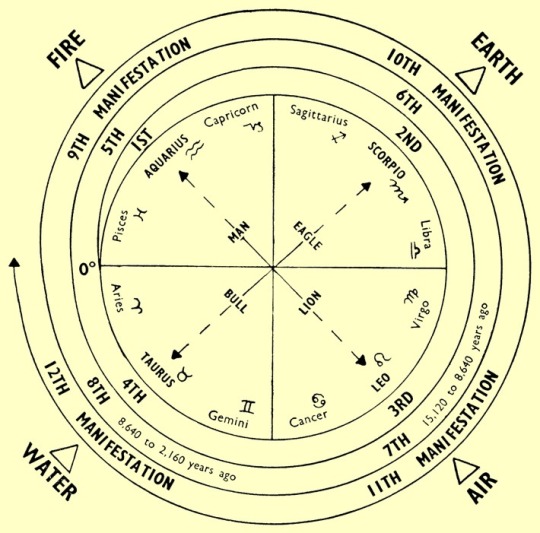
Quotes regarding the Gnostic Circle
‘The Gnostic Circle is merely the combination of the zodiac – the occult circle which contains the knowledge of evolution – and the structural pattern of the solar system. The Circle of 12 is the zodiac, and the Circle of 9 is our actual solar system, each orbit representing one year of Earth life. The joint harmony of these two, superimposed or synthesised in one circle, is what constitutes our key to the evolution and flowering of the seed of the Spirit. In fact we can say that the Gnostic Circle is mainly for this purpose: it shows mankind the ultimate and ideal perfection that can be attained during this particular phase of the evolution, during this great transition point from animal-mental to the more divine mankind.’
– Patrizia Norelli-Bachelet,
The Gnostic Circle, p. 159, 1975
‘The Gnostic Circle allows us to measure the progression of any event in time. And it provides the means of assessing an event’s relevance to time and place within a global and universal context. Above all, it permits us to appreciate the interconnectedness of events through a unified, spherical approach to Time. The Gnostic Circle is a yardstick which can be applied to any event and by which that event or object may be made to reveal its intrinsic nature and objective value. In ancient literature and tradition, such a tool was sometimes referred to as the Golden Rod, or the Philosopher’s Stone. Its value resided in the fact that because of its special relation to Time and Space, it could provide an objective means to assess the truth-conscious substance of any given situation or event or object. In a word, it could objectively reveal the element’s inner pulse and place within the greater harmony of life on Earth and within the solar system.’
– Patrizia Norelli-Bachelet
‘… it is our purpose here to speak of some of the essential reasons why the knowledge has been contained and transmitted in the zodiac and the structure of the solar system … Moreover, it is our intention to give as clear a picture as possible of the true purpose of astrology, and in which way it can be an asset in the development of the spirit….’
‘Cosmic harmonies give us the understanding of the movement of progression within the eternal. The art in its totality is transmitted so that man may have a clear vision of the process of evolution, and above all, of its ultimate goal for any particular Age…’.
‘… in order to understand this play, we must first realise that the ultimate aim of creation is to be an ever more direct manifestation of the upholding and underlying spirit.
‘The zodiac gives us a picture of this outer movement of evolution which has as its support the inherent spirit. It represents the aspect of the unique Energy in a state of movement, as opposed to the aspect of the unique Energy in a state of rest. The purest example of the former is Matter, and the purest example of the latter is Spirit. These two poles represent two aspects, apparently contradictory and opposite, of the One Unique Energy, working itself out into its fullest manifestation.’
Thea, The Gnostic Circle, Chapter 1,
‘Essential Purpose of the Study of Cosmic Harmonies’, p.3
Links to More Information on the Gnostic Circle
The Gnostic Circle – a Synthesis in the Harmonies of the Cosmos, Aeon Books, 1975
The Gnostic Circle’s Table of Contents
The Zodiac and the Perception of Unity
29 notes
·
View notes
Text
Quick Thoughts on TRR Book 1, Chapter 6
• Two things happen this chapter: you meet the Queen and (optionally) eat cronuts.
• That's it. That's the chapter.
• Title: The Queen of Hearts.
Alternative Title: The Regina Roast. She can and will roast you if you have even a hair out of place. You will be burned to a crisp by the time she is done.
• Fortunately you'll get the opportunity to roast if you decide to walk back with Drake after cronuts. Even reading it on the YouTube playthroughs was quite satisfying 😅
• You also get cronuts if you pay. Nomnom.
• Me Back Then: Cronuts sounds like a cross between a crow and a nut.
Me Now:..Please stop.
• Throughout Book 1, you have characters who will appreciate you no matter what (the LIs definitely fall into this category), people who will ally with you mainly because you convince them you're worth forging an alliance with, in their individual scenes (the ladies of the court and the press)...and people who keep track of your progress over the course of the book.
• The last category is especially important because it alerts you, the player, to how your MC has performed thus far. Now I have two MCs who interact with everyone in very different ways, so I can actually see this in action and compare notes. The characters that keep track of your overall performance, will not hesitate to point out how you've done in previous occasions (like the first press interview, or the impression you left on King Constantine) and their dialogue will be coded accordingly. At least two people fulfill this role in the first book.
Who are those two people, you may ask? Well, see for yourself:
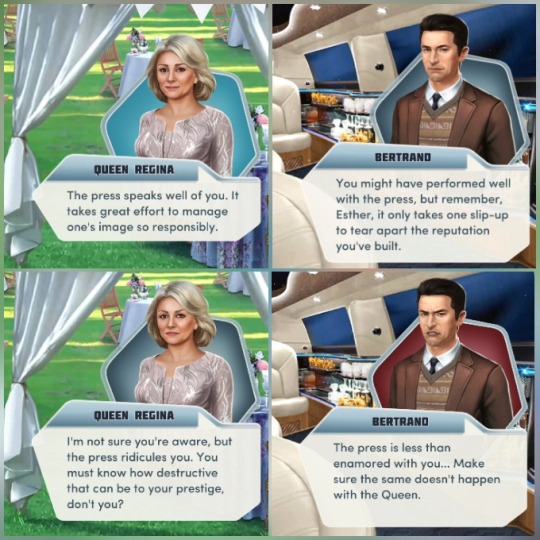
(The top two screenshots are from my Esther playthrough, and the bottom two from my Persephone one).
Bertrand: In his case, it really comes as no surprise that he takes note of how we've done. He's our sponsor and mentor, after all. And we are representing his house - so if we perform badly it ends up reflecting on their house as well. So if he doesn't keep track of how we're doing, then who will? However, as the social season moves forward and his stress over the house's financial situation takes precedence, he steps back a little in terms of this. By the end of the book he expresses his support and belief for the MC regardless.
Queen Regina: Regina is known for being the torchbearer of stoicism and for destroying you with her snark (as can be seen in her responses to the 'hat' options). But some of the truly interesting insights you can get about her come from a failplay. She also is shown keeping track of the MC's progress. A scene like this one shows her being dismissive of you if you don't impress her...but in the course of the story, this will change. Overall...I find the fact that some of her scenes are coded to reflect the MC's progress in the social season a lot more interesting, because that's something we would expect from Bertrand who is directly guiding us, rather than her.
• So this chapter begins where we left off, with Hana and the MC talking about the upcoming event. A dainty little tea party, where we will meet and talk to the Queen for the first time. You have a choice between stating you love tea parties, or telling Hana tea parties aren't your thing. I highly recommend the second one coz Hana calls a tea cozy "a sweater for your teapot", proving that she can be insanely funny when PB and this fandom actually choose to remember 😂
•
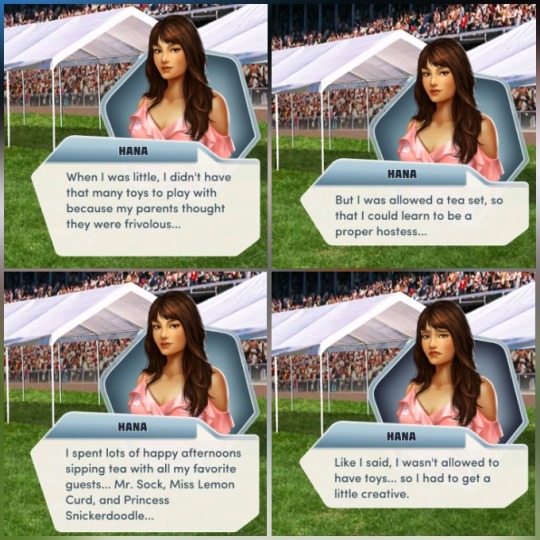
At this juncture, Hana - who loves tea parties - tells us about her childhood experiences with a tea set (there will be a callback to this in her childhood scene in TRH, and it looks and sounds a hundred times more disturbing than what an adult Hana says now. Understandable, because at this point Hana cannot even begin to contemplate how messed up these aspects of her upbringing and childhood was (she is not completely blind to the damage - as can be seen from her piano scene - but she does show signs of normalizing her parents' controlling behaviour and attitude towards her).
• In the limo, Bertrand enquires about our blossoming friendship about Hana - thereby keeping tabs on those we ally with - before moving on to the important business of the day - impressing the Queen.
• Whether you ask what she likes or what she hates, the responses state similar things:
- a great sense of style and fashion
- she favours ladies from Cordonia, and is wary of foreigners (but somehow not 'wary' enough that she will do disgusting things like her husband does).
- has a high regard for protocol and can be very angry when it's disregarded (ergo correct use of titles and positioning yourself behind her are a must)
- doesn't like funny people (in fact, if you do choose the funnier hat options, she stresses that "fools use laughter to cover up their own ignorance")
- is pretty competitive, and the implication is that she likes to put up a good fight with a worthy opponent
• We get down at the venue, which the MC can either call a million dollar picnic (mentioning money and costs like that! classless! says Bertrand) or like something out of the set of Downton Abbey (television! such a travesty! says Bertrand). In any case, we wait alongside the other ladies, arriving just before Regina makes her appearance.
• Since RoE was the series that introduced Cordonia to the Choices audience, there's often going to be that one chapter where you'll find more than one reference to that series. We associate the royal family and Madeleine with the TRR series now, obviously, but back then these were side characters only briefly from RoE. So we obviously had our impressions of them set in stone, and to view them differently, we'd need a completely different lens (more on this later).
• Me Back Then (on seeing Regina): This person yapping about stoicism. Wasn't she the one who threw a hissy fit over her stepson wanting to marry an American in RoE?
Me Now: ...Leo existing is a good enough reason for anyone to have a hissy fit.
• Me Back Then AND Me Now @ Madeleine:

• It's also interesting to see the reactions to Madeleine before and after the announcement of her joining the social season has been made. Before this, Olivia demands we speak of her with respect, using her title and insisting we know her importance, and Kiara and Penelope speak of her in tones of pity. So long as she is not their rival, they look up to her as someone who has been in their place, and won the season. But once it's made clear that she is a suitor as well, Olivia shows the strongest reaction (naturally). The other two express surprise at the news, but are mostly neutral towards her as can be seen from the fact that they casually chat with her in Lythikos.
• Madeleine and Regina were clearly gossiping about us before they came here 🤭
• Regina gets introduced to all the suitors then finally turns to us, and between the Derby and the car ride to here, has learned quite a bit about us - including our first impression from the press and the moniker they've given us:
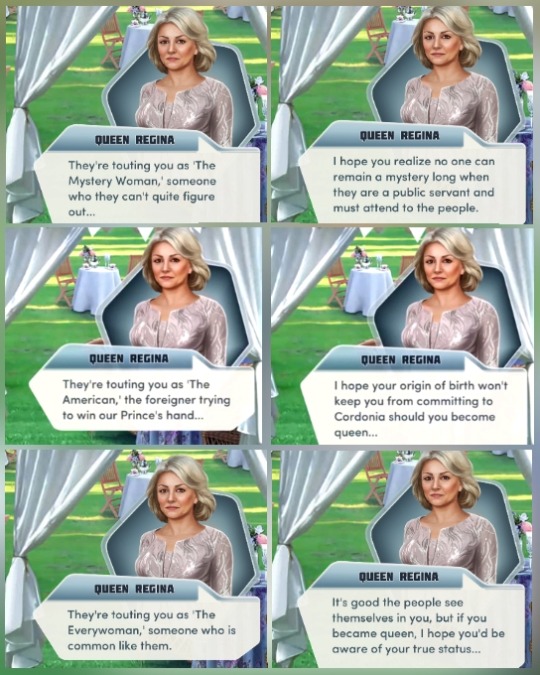
(Screenshots for 'The American' from the assyrianprincess YouTube channel)
I kinda like this bit because it shows us the flip sides to how we navigate this society, the way we might be expected to please different people whose needs and interests go in opposite directions. If the press, the representative of the people, finds these monikers exciting, interesting and relatable, then Regina makes it clear there is a flip side to those same monikers as well. As I've said earlier, the MC's identity as an anomaly, a foreigner and non-nobolity (yet) is what makes her stand out amongst her competitors, but those same things may also contribute to her struggle to be a part of this country and be accepted by these people.
• The Queen's questions range from discussions on what makes a great leader, the importance of stoicism, and governance. Fairly simple questions, and the answers that she loves the most are the ones that subscribe to both her and the royal family's ideas of 'putting on a brave face for the country'. The alternatives that displease her, are either to crack (hat) jokes, or to subscribe to a worldview that places emphasis on being relatable (charisma, and showing the people that their rulers can be human). So while Regina's not entirely wrong about her ideas of ruling and governance, there is a clear distance between the monarchy and the people that Regina and Liam would genuinely want to serve. This is a distance that Liam will later acknowledge in his portion of the cronut scene.
• The irony is also that eventually, Regina herself will crumble under the weight of all these lofty principles, and discover for herself exactly how impossible they are, once she witnesses Constantine die in front of her own eyes. I find the sequence where the MC comforts Regina in Valtoria to be an inverse of this one, because she blames herself for not living up to her own principles, and the MC has the option to validate her pain and encourage her to let it out. There (especially if you will be Queen soon) the roles are reversed, and the MC's relatability - even if she's done terribly - wins out in the end.
(And she wears the mother of all hats).
• If you don't take two steps back while the Queen is walking, Olivia and Penelope make fun of you, Hana comforts you, and Kiara doesn't say a word. Now this could be because she already had a go at us the last chapter, but I feel like it could also be because she is stepping back and taking note. She recognizes early on that her energies are better focused on networking than on trying to catch the attention of a Prince who already prefers someone else and a court that won't choose her. Remember, the next time we interact with her, we're trying to gain an alliance.
• Liam joins his stepmother and the suitors for a croquet match, where he chooses the MC regardless over any other suitor. Olivia is shocked, and Penelope is the one to speak sensibly about how the Prince has made his choice.
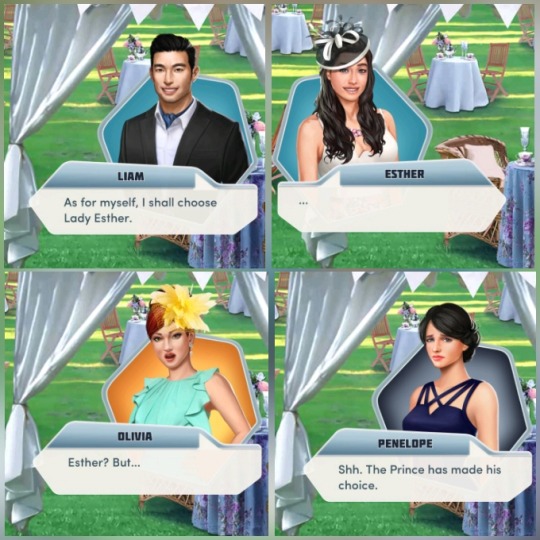
It's a small moment, but what follows two chapters after is Olivia secretly targeting us during her time hosting the court in her estate, and her increasing desperation. Plus Kiara and Penelope being ready to become allies rather than competitors.
There's been news that highlights the MC as a suitor Liam has a preference for, but this is probably the first time the ladies of the court must be openly confronted with it. And of course, Olivia is the hardest hit, and works the most at undermining the MC because her hurt and fears get the better of her.
• The croquet match takes place in two segments: one where Liam gives the MC a run-down of what the game will be like, and the second, where she can actually choose to take the win or allow herself to lose so the Queen will look like the victor. In the middle of these two plays, the Queen gets to slip in another question about governance.
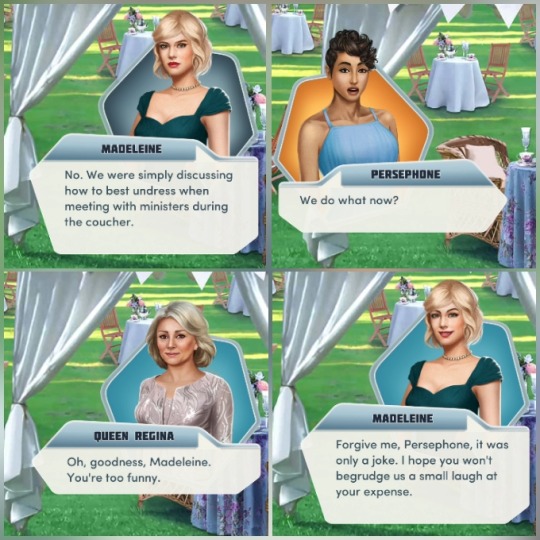
Uh huh, uh huh, so when I make jokes I'm an ignorant fool, and when your niece does it suddenly she's Cordonia's Next Top Stand-up Comedian. Uh huh, sure.
• Either that or maybe she's had to put up with Adeleide's 18+ humour for so long that she's almost grateful that it's her uppity niece delivering the gags instead 💀 💀 At least she can be assume the humour would be PG-13 (provided Madeleine's not drunk, and even then she's not been as risque as Adelaide is when she's sober).
• The Queen purposefully opts to lose the match just to see if the MC is the kind that will play to win, and hates it if you decide to let her win. If you do win, she will alert you that things will only get more complicated for you from here, and she may not hold back next time. Back then it read as perhaps a bit antagonistic back then, but now it reads a little differently to me - more as a reminder to the MC that this social season won't be an easy one for her.
• Regina was definitely testing her in a couple places to see how she handled herself in a couple situations.
• If you win her approval, she praises you for standing out among the rest ("you've proved yourself to be unlike the other ladies in the court, which is no small feat in my eyes"). If not you're...tolerable. But she will still watch out for your progress!
• Here's one of the rare times Liam gets to tell you to your face you performed badly (besides the option at the ball if you offend Penelope), even if he still does make excuses for you. From here on out, he and every other LI will be mostly making excuses for your failures whatever they may be:
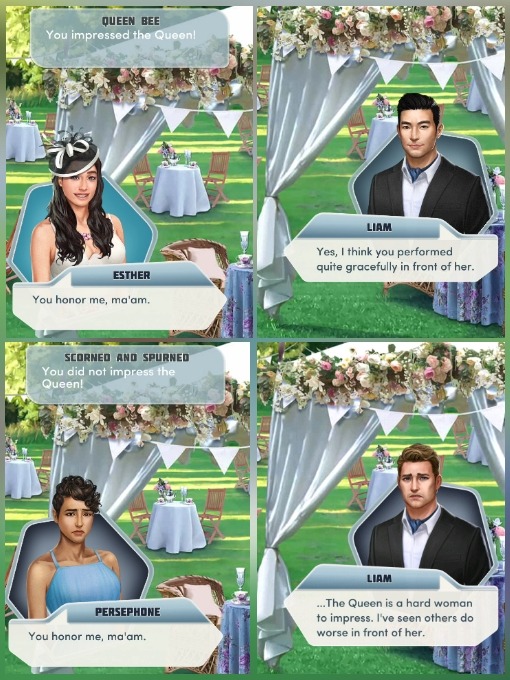
• Now that our first meeting with Queen Regina is over, we can now kick back and relax with the rest of the group!
• Drake complains about the finger foods laid out for a tea party (it's a TEA PARTY, Drake. They're not going to be serving cheeseburgers and hotdogs at a TEA PARTY), and two of the MC's three dialogue options come with relationship points ("you WOULD complain about free food" and agreeing with him). The first option seems to be the one I'd imagine a Drake stan would love because there's a slight bit of teasing there, plus Drake shakes his head, smiling, which is a nice shift from the grumpiness and snark of the previous chapters to his attempted friendliness of the Lythikos chapters. It's also a bit of a teaser to the MC's (optional) teasing of Drake later on in the cronut scene.
• ...I could have happily lived out the rest of my life not seeing 'escargot' and 'aioli' side by side in the same sentence.
• The poor MC's mind is blown from the sheer number of people who don't know what a cronut is (Me Back Then was still like WTF is a cronut).
• The highlight for TRR - besides the LIs themselves - are the group scenes. The group had three men who grew up together - or at least in some proximity to each other - and two women who were outsiders. There was a familiarity to their interactions that you wouldn't find so easily in, say, a book like TF where the relationships among the LIs grew alongside their relationship with the MC. I still recall how often people who didn't like the series would mention that the group interactions were a big plus for TRR. The cronut scene really does show you why. Even though it's very centered around whoever the MC wants to be romancing, we get a glimpse of their shared experiences at the palace, coupled with their mutual joy when trying out this new treat. We even get hints from Liam and Maxwell about the old, not-so-stressed-out Bertrand!
• The scenes meant just for the LIs are split into two portions - the first is the romantic one inside the bakery, where the MC can choose who she wants to sit next to and subsequently flirt with (no Maxwell, sorry. Though some of the subtle hints for him becoming an LI will emerge after Chapter 8!):
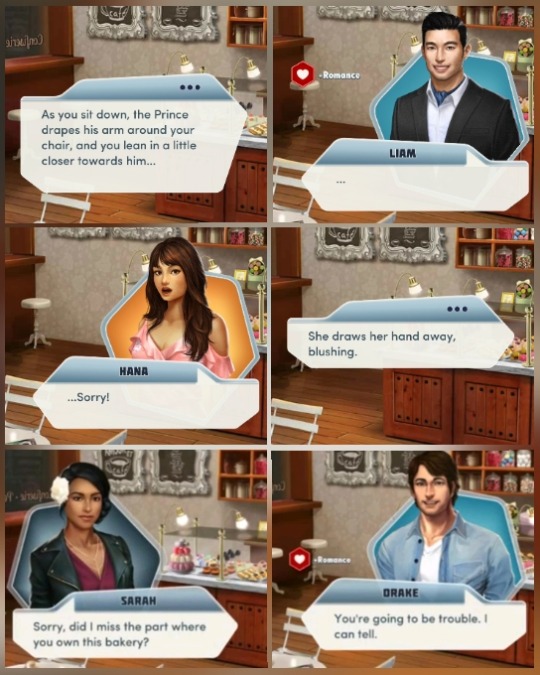
(Screenshots for Drake's scene from the Ashley Barrus-Gardner YouTube channel)
Each one has a different vibe to it. Liam is clearly smitten and not ashamed of showing it, draping his arm behind her chair. Hana is shy and confused, feeling those first stirrings of love for this woman, unsure of what it could all mean. Drake's is sarcastic and witty, and the MC is at her sparkling, biting best in both Drake portions of this scene.
• Our third RoE reference! Bestien appears at the end of our cronut trip, and when Liam apologizes he smiles and reminds him that his brother has done worse.
• The second LI centric portion allows you to build relationship points rather than romance ones. The MC chooses who to walk back to the palace with, and the LI tells her what has begun to shift for them, thanks to her presence:
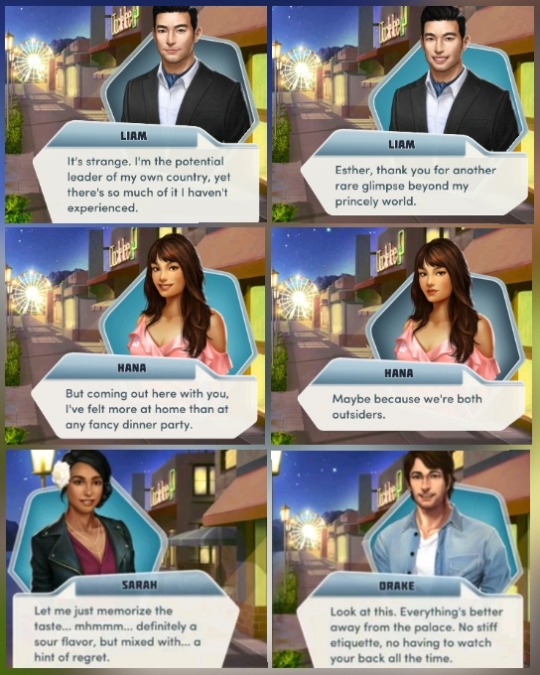
Liam: Speaks about this experience as an eye-opener to regular life in Cordonia, is baffled by how little he knows of his own country and people, having lived such a restricted life in the palace. In one option, he openly calls his world the "statesman's bubble". As a commoner, the MC has shown him in this scene glimpses of life outside of his "princely world". He begins to let go of some of his preoccupation with protocol here, telling the MC that perhaps it's not too bad an idea for him to spend more time with her outside of the social season events. This is good buildup to his hot tub scene in Lythikos.
Hana: Is largely very grateful to the MC for keeping her company and sharing this experience with her, as she is lonely and has very few people she knows personally enough to invite her. Both she and the MC speak of their identities as outsiders who stick together because both of them know the pain of assimilating into a culture that you didn't grow up living. I kinda wish more of that aspect was explored, it would have been an exciting route to take for the story!
Drake: Drake doesn't openly speak of what he's learned from the MC or what she's given him like the others do, but the advantage in this scene is that he's begun to thaw towards her. She can choose to tease him relentlessly through the walk back, and he responds positively to it, telling her she is more fun when she's "not pretending to be a princess". As I have mentioned earlier, this helps to set the stage eventually for his friendliess to the MC in Lythikos.
• Overall, you can see why this scene is so popular and remembered so well. Others that are more detailed and extensive and fun have emerged since, but this bit was lovely to read just for those first few sparks between the friends. I knew I wasn't expecting that when I first saw this scene.
• It's now time for Lythikos! The chapters in Olivia's duchy (only 2 really) are fun and packed with a lot of interesting stuff, character development and plot details. I honestly can't wait to jump in.
• It's been at least two years since this series first came out, I think, and what's intriguing to me is how the lens of this whole story, and our view of some of the characters, has changed. I remember coming into this story straight from RoE and TCaTF, and back then I was still looking at everything from a very Leo perspective. Remember, in RoE Leo was the only Cordonian our MC had regular contact with, and therefore we saw this country from his point of view. So Constantine was stuffy but more supportive, Regina was ridiculous in her expectations for protocol, Liam was remembered as "thinking he's smarter" when Leo is away from him but extremely supportive of his decisions when he needs that support. Madeleine was the jealous angry fiancée getting in the way of true love.
Our perspectives have taken such drastic shifts since. When Leo stopped becoming the center of the story and we actually GOT to see and experience Cordonia as readers - suddenly a lot of things made sense. Regina's insistence on stoicism. Liam's pressures and burdens. The fear in the country once Leo abdicates. The stress that Liam, as new Crown Prince, would have to go through transitioning into that kind of role. Suddenly Leo's abdication wasn't a brave thing he did "for love" or "for honesty", but an irresponsible (though necessary) act that had repercussions.
In a perspective that does not center Leo, we see all that Leo misses. Constantine is no longer benign, he is capable of doing the worst things to a suitor under his protection if it means he can get her out of the way. Regina is still uppity and stoic, but can also be someone with incredible foresight, who can read the signs and embrace the change the best she can once she realizes it's coming her way. Liam is a man who was built to love and lead this country, even if he sometimes doubts his own potential. Madeleine is still a horrible human being, BUT not in the "jealous fiancée" way we witnessed in RoE Book 2. In fact, I know those who deeply dislike her, and still feel that she deserved better than what Leo was doing it her, and the rejection she faced from both brothers.
• Regina definitely comes across as cold, distant (and in an initial fail play, even rude) and not exactly interested in you. But she does keep tabs on your progress, and often highlights it before the activity itself can start.
• As I've mentioned earlier, Bertrand and Regina are specifically coded to make us aware of how we're doing. Does anyone else in the book get to do this? One more person, and I will speak of them somewhere along the line.
• Failplays are incredible because there are so many things you see SO DIFFERENTLY until much later. There's a lot you can figure out from the responses to the wrong answers alone.
• ...I need a cronut now.
• Until next time folks!
• The TRR MC and The Saga of Hats - A Short Summary in Nine Pictures:
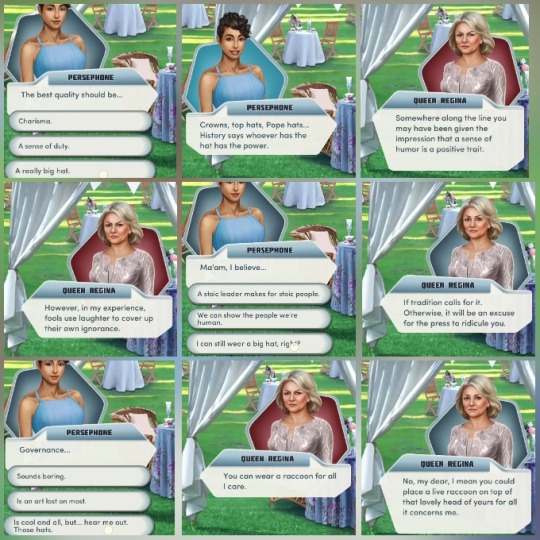
Persephone was the one saying it, but you can bet Esther was the one thinking it!! 😁😁
• Also thank you Your Majesty for noticing how lovely my head is 😁😁😁
• That's all for this week folks! Hope you're as excited as I am to explore Lythikos!
--
• Tally Counts:
Number of Times Drake has Called Esther/Persy by Their First Names: 4 (I missed one scene at the stables in Chapter 5, and this time while challenging the MC to a race back to the palace)
Number of Times Tariq Has Mentioned His Shoes: 1
Number of Times Drake Has Taken A Drink that’s Not Whiskey: 1
Number of Times Someone Has Called A Reigning Monarch 'Your Highness’: 2
Number of Times You Can Leave Hana Shook. SHOOK I TELLS YA: 2
Number of Times We See Penelope’s Angryface: 2
--
#long post#the royal romance#trr quick thoughts#trr qts#king liam#hana lee#maxwell beaumont#drake walker
28 notes
·
View notes
Text
Till Min Älskling
Anyone remember this one? I guess it’s right at four years old, since I wrote it for TDOE back in 2014.
Till Min Älskling,
It is less than a day since our marriage was finally made complete, the consummation of our love. Even as I write this - “working,” ostensibly, at the desk in the quarters we now share - I just caught you glancing my way, saw your soft smile and hooded eyes, the flush across your cheeks, and I know you are thinking of it, too. The best part, though, is that you look happy.
If I could bring that light, that joy, to your face every moment of every day for the rest of your life, it still would not be as much as you deserve. But I swear to you this, my darling Elsa; I will spend the rest of my life doing all that I can to give you that happiness. If I have a purpose in this world, it is that.
And it is a purpose I thought would be forever unfulfilled. Do you know when I first felt a spark for you, a tiny flame carefully kindled and carried across so many miles and so many years?
Alas, the day and time are lost to me, fallen victim to faulty memory and failing attempts to deny those same feelings. They frightened me, Elsa - oh, how they frightened me! You know well what a coward I am.
And yet, you have accepted my love regardless. You are everything I know I will never be. You are everything of which I will never be worthy. And for so many years, a part of me has known how much I love you.
For a very long time, i tried to deny that part of myself, to convince myself that it was merely a result of your philosophical presence in my life long before your physical one. I knew you for so long through the words of your father; surely, I thought, this is the natural extension of seeing what has always been a product of the imagination unexpectedly made flesh! And truly, it took me by surprise, on our first introduction so many years ago, to actually meet someone who had heretofore only existed on paper. I’m sure your first impressions of me were far from favorable, considering I was behaving like a puppy, overeager to please but as yet not particularly well-versed in etiquette. You have spoken of wishing you had taken more time to get to know me - I lay no blame on you, considering the circumstances and my behavior.
But it was sometime then that the spark was kindled - the realization that not only were you so much more than words on a page, but also that you were the most remarkable person that I had ever met, would ever meet. And despite my best efforts, that spark only grew.
Did I truly believe I might ever see that love reciprocated? I hoped - but I did not truly believe, no. Too many times, I set myself on a path I knew was doomed to fail, and at some point, I finally learned my lesson. But hope - yes, there was always hope.
I might have forgotten the moment when I realized I was in love with you, but I shall never, as long as I live, forget the day I knew it was reciprocated. I will never forget how beautiful you looked, the way the light reflected in your eyes, the way your hands felt when I took them in mine. I will never forget you in my arms - how right and wonderful, at that moment, the whole world seemed to be. I will never forget any moment we have had together since - not if I can prevent it. A true narrative began then in my life - new meaning, new purpose. I do not know where our story ends, but I know the journey through it will be a magical, beautiful one.
Elsa - my darling Elsa - know always: you were the answer to all of my questions.
I love you.
- Alarik
Til Alarik, Min Elskede Mann
So many things I once thought were impossible, because of me, because of who - or what - I am. Angry mobs screaming “monster” were never necessary to see one in the mirror. I knew. From a very young age, I knew, but I did not understand. I didn’t want to understand.
I just wanted to be anyone but who I was. Even as at the same time, I believed I deserved it - to be a pariah. An outcast.
I hurt, again and again, the person I loved more than anyone else in the world. I deserved every torment life could offer me.
I lived with that truth for so very long.
There are many people to whom I might owe an apology, but only two I felt deserved an explanation: Anna, and you.
But as I have discovered time and again, through all the years of my life: I lack talent in the spoken word; I stutter and stammer; I lose the path of my thoughts, and fail to backtrack to the start.
Anna is patient, but she has her limits, and I fear I will never adequately express for her all that weighs on my fractured conscience. Perhaps, if I find the self-fortitude to deliver this letter, rather than casting it into the fire, I will try to write to her, as well.
(Speaking of fires - I’m still getting used to trying to sleep, once more, in a room made so suffocatingly warm by one. I trust you appreciate the sacrifices I make for you!)
From a young age, I knew that my future held not only the running of a kingdom, but also, in all probability, a marriage made for diplomatic reasons. It was the case with my own parents, it would be the case for Anna, and it would be the case for me, no matter the fairy stories that spoke of love and romance: such things existed for me no more than a poisoned spinning wheel and cottages of gingerbread.
Then, of course, I realized the darker truth: no negotiations would be made for my hand. No family would risk their child on marriage to a monstrosity. I would be spared the possibility of a loveless union, but equally, I could never anticipate a loving one. I could only hope Anna was not assumed to carry the same taint in her blood; she wanted so badly to believe in the possibilities of romance. Selfish thing that I am, I couldn’t bear the thought of being responsible for yet another of my sister’s disappointments.
But I found out later, much later, that it was me, not Anna, for whom my parents were attempted to negotiate a betrothal at the time they were lost. I didn’t have the faintest inkling - but when I found out, all I could think of was what Anna would have thought, finding I had taken something else from her. With a history of such thoughts, I still marvel that I was surprised when she showed up on the arm of the first eligible royal she happened to meet. It seemed the beginning of the end. I could never have imagined it heralded the start of wonder as well as terror.
The young woman I was then - I doubt very much you would have seen anything but a cipher, a half-clever ruse. You have always seen so deep within me. It is one of the traits, to my own surprise, that I have come to like best in you. I enjoy being seen as who I truly am, at least as far as your biased gaze observes me. My role and my strange abilities so often create facade that is view enough for most.
But I digress. My point: I never anticipated, initially, an opportunity to marry for love; later, I never anticipated an opportunity to marry at all. Perhaps as a result, when the responsibility became mine, I reacted rather poorly to Anna’s first attempt at betrothal. Hindsight may have shown this to be for the best, but it was, honestly, due solely to panic on my part. In some way, I have always seen Anna as my sole chance at redemption. Her marrying for love, then, not diplomacy, was more important to me than was perhaps politically expedient. I will credit myself with one thing: doing everything necessary to allow her to marry Kristoff, when that proved to be her wish, and to assure that her children might be legitimate heirs to my throne.
I believed, then, that I had done my part, as far as such things went. My sister in a happy marriage to a wonderful man like Kristoff, and Neta the healthy child of their union. My feelings for you, despite their gentle, gradual growth, came as quite the shock when I finally forced myself to acknowledge them.
What am I trying to say here? I wish I knew for sure. Perhaps I’m no better, in the end, with written word than with spoken. I can’t think of anything I’ve attempted to write aside from my schoolwork and official correspondence - and it is possible I would better grasp my own intentions with the familiar format of an essay or diplomatic missive.
Or I could build you something from ice?
(Actually, I have strong suspicion you might like that very much!)
I have rambled on long enough, I think, with no obvious conclusion in sight. I was hoping that writing this might ease my mind - should you receive it (or merely stumble across it) at some distant point, I should say that I am writing it in the midst of another half-miracle: I believe marriage unlikely, marriage for love almost outside the realm of possibility. But carrying a child?
I would have harshly, unequivocally dismissed the very notion.
I am frightened, Alarik. As frightened as I have perhaps ever been - and fear is, for me, an old friend. I know that you, and scholarly authorities, maintain my powers hold no threat for the quickening life I carry - but my heart returns always to my tiny sister, so still and cold in my arms.
And yet, the same arms ache to hold the child that grows within me, the very physical manifestation of the unwarranted love you have gifted upon me. Your faith in my ability to navigate these uncharted waters gives me such strength - such hope. Your trust in me is the greatest gift I will ever receive.
So many paths that I believed closed to me, you have helped me find my way down. With you as a light in the darkness, I conquer the unknown.
Jeg elsker deg.
- Elsa
Till Min Älskling,
I write this as you speak low, soft words of encouragement to the infant at your breast, both of you entirely absorbed in one another. “Johanna,” I have learned from your sister, means “gift from God” - she informed me it is related to “Joan.” I meant to ask you about the relevance of the last, actually; I know Johanna is your grandmother’s name, but I have not come across a Joan in the annals of Arendelle. Perhaps this will jog my memory later.
I have learned quickly that I prefer not to interrupt your interactions with Jenny: few things in life give me as much pleasure as watching you with her. In three months, it seems to have become wondrous second nature for you, mothering our child. I should finally admit, through this safe medium of paper and ink: As you feared pregnancy and birth, I feared you would refuse to allow yourself to love the baby once she arrived. Rarely have I been so pleased to be proven wrong! You have taken to it, to her, so naturally. I can hear your arguments to the contrary, my darling, were I to voice these thoughts. “I’m just doing what I saw Anna do,” or, “I’ve read a lot of books, I’m just following directions.”
But it is not that simple, and you know that as well as I, whether you are inclined to admit it or not. Not everything can be learned by extension: many things, you must just do, and discover in perseveration any talent or natural affinity. As Anna could attest - she can watch how beautifully you can skate across ice, but it does not ever seem to improve her own performance! Some things, you can either do well, or you cannot. And you, darling, care for Jenny so, so well.
She fascinates me, you know. I have not often since my own childhood spent much time around children, and even less around infants. There is the added, selfish bonus here - the infant in question is made up for half of you and half of me, and somehow, that makes her more fascinating still. I seem somehow almost hardwired to see with amazement every change in her, every new development or act of self-discovery. (Though I will admit, it will take a lot to displace my most cherished memory: our shared mirth at Jenny’s obvious delight upon first discovering her hands!)
But watching you and her together: that is one of the greatest gifts that life has given me. I watch you when she wakes crying, the way you soothe and murmur, the soft song to ease her back to sleep, cuddles and smiles and gentle touch if she calms, and the way she stares up at you, you who are the center of her entire world. What a wonderful, loving world it is, too!
I thought, for a very long time, that I could not love you more, that I knew your bravery and your strength and your intelligence, and that left me so enamored that no matter what happened, I thought it could not be more than it was. How wrong I realized I was, the moment I first was able to place our newborn daughter in your arms!
I truly believed I would never have children of my own. For a very long, as you know, my life held the possibility of ever-present threat, and risking a child to that would have been the height of selfishness. By the time all that was dealt with, of course, I was well past the typical age by which one would be expected to marry. And truly, by then, I knew - I could love no other as I love you. And I believed wholly that my own cowardice had destroyed any affection you might otherwise have felt for me.
Wonderful woman that you are, though, you would never deny someone a second chance, just as you believe so many gave to you. (Anna, I suspect, would disagree that you ever had need of them!) And you gave me mine - and so much more, more than my wildest dreams might have imagined. Including the daughter I can see even now warm and well-fed in your arms, fighting sleep, those slow, heavy blinks that mean the inevitable will have her soon.
I know that you, too, believed you would never have children of you own, though for different reasons. I do remember when you told me, so many years ago, that Anna felt it her duty to provide the kingdom with an heir, because you believed yourself incapable of carrying a child. I had my doubts, even then, but of course I had no place in your life to say that - more cowardice.
But I have always believe din you, Elsa - in your strength, your power, your intelligence. You are a wonderful mother - but you are, always will be, so many other things. So much more.
I love you, darling.
-Alarik
12 notes
·
View notes
Text
Captain Harlock & Miime: Musings on Isolation, Loneliness and Grief
(For the scope of the analysis I will be focusing solely on the Harlock/Miime relationship as it is portrayed in the 1978 Space Pirate Captain Harlock TV series. If you haven’t watched this anime yet, you really need to.)
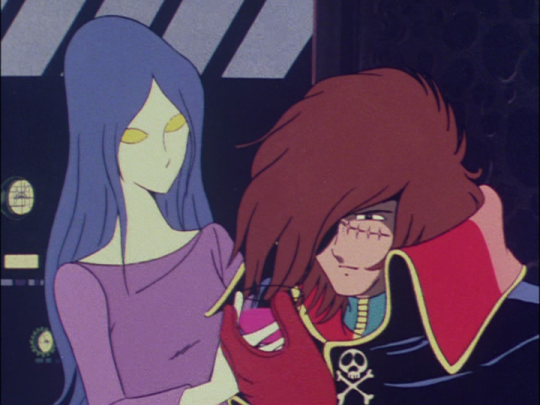
“I am Miime; I am the woman who has given her life to Harlock.” - Miime, SPCH
It did not take me long into my sojourn into the 42-episode long self-contained Space Pirate series (and my first Matsumoto anime) to discover just how much I loved Miime, the tall willowy, mouthless, alcohol-swilling, harp-playing, soft-voiced alien woman whose relationship with Harlock is almost as meaningful and touching (in this series) as the relationship between Harlock and Tochiro.
Miime quickly became an exemplar of everything I wanted to see in a supporting female character. I already knew what I didn’t like: female characters who nagged, female characters who made the primary male characters awkwardly uncomfortable, who made them stammer, blush and act like idiots (if they were of high-school age) or forced them to supplant their ideals and opinions with their own, either through sheer bitchy determination or the pervasive ‘power of love’ angle (if they were older and *allegedly* mature). I didn’t know what I hated more: the female characters who ruthlessly and annoying imposed either their emotions, ideals or bodies onto their male counterparts, or, conversely, the male characters who allowed them to do so and conceded to the woman’s wills. I’ve always been more interested in fictional male protagonists then in female ones, and I always view the arrival of a new female character – be they hero or villain – into a novel or show with a certain amount of trepidation, owing to the drama they ineffably inflict upon that particular fictional universe, whether this is intentional on their part or not.
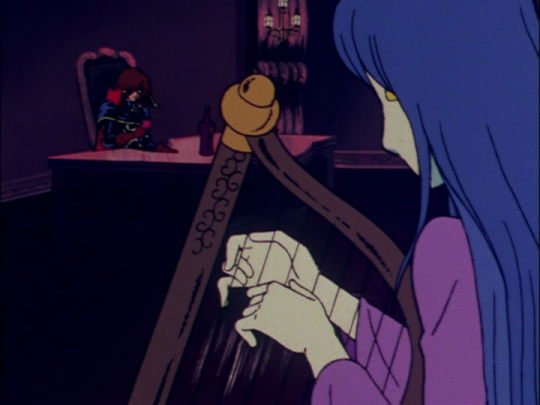
Miime was blessedly free of all of the above behaviors. Everything about her, from her simplistic yet elegant character design, to her voice, mannerisms and hobbies, spoke of maturity, of refinement, and, most important to me at least, the desire to be true to her own person, to remain herself, as she is the last living remnant of her race. Perhaps if she had been a human woman her relationship with Harlock would have been radically (an unsurprisingly) different, but as she is a Juraian, an alien, a literal ‘Other,’ she abides by her own codes of conduct and not once does Harlock ever request or demand that she alter her behavior towards him, just as she never tries to ‘change’ him, as most human woman would try to do.Thus she remains unique, mysterious and ultimately unknowable - much like Harlock himself.
And the relationship the two of them share is unique indeed. Harlock makes no demands upon Miime whatsoever. She has no specific duty as a crew-member of the Arcadia and is free to move about the ship as she pleases. She pours Harlock his wine, but not because she is his serving girl and it is her duty to do so; she plays the harp for him, but not because she is his court musician and it is expected of her. Everything she does for Harlock is for their mutual enjoyment. They do not ask or demand anything from one another, they simply do things together, organically and naturally, in complete emotional and physical freedom. They are perfectly at ease with each other, displaying no awkwardness or stress when together. Miime does not bicker with, fight with, flirt with, nag, challenge or impose on Harlock’s freedom in any way. She has pledged her life to him, even stating she would follow him into hell if he ever asked her to. Her devotion is total. Her loyalty is beyond reproach (1). Her relationship with the Arcadia’s brooding Captain puts her in the unique position of possessing true knowledge of his personality, allowing her to share her insights as to what kind of man he is with the other crew-mates, who are often confused by Harlock’s decisions and actions. She becomes his unofficial spokesmen and advocate and never doubts that he will accomplish his goals.
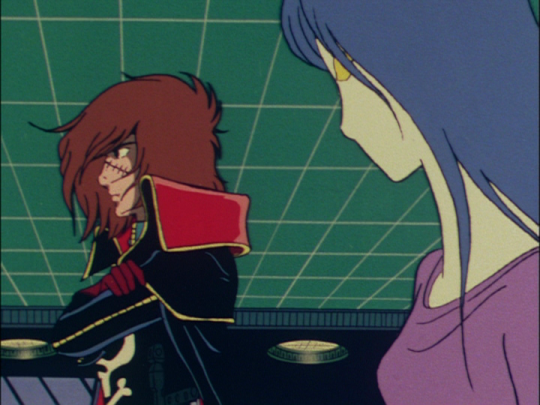
Likewise, Harlock confides in Miime, telling her his plans, expressing his occasional doubts and frustrations or simply reminiscing about the past, often over drinks. But Miime is not a merely passive character Harlock keeps around as a drinking companion. Miime proves her worth as a fighter, displaying competent shooting-skills and reveling hidden depths of power when Harlock is threatened. Unlike Tadashi Diaba, however, she is not learning how to become a warrior or out for revenge against the Mazone invaders. Like Harlock, much of her story has already taken place and she has already reached the pinnacle of her character development. To remain at Harlock’s side is enough; she has no set goals or plans like Tadashi, no ulterior motives or hidden agendas. Whatever else is happening to the galaxy at large is inconsequential as long as Harlock continues to wander the stars under his ‘flag of freedom.’ Calm, quiet and thoughtful, Miime stands unobtrusively by Harlock on the command-bridge, ready to give advice or make pointed observations, or fills his cabin with the soothing melodious music that relaxes him while the rest of the crew revels in the Arcadia’s corridors, living for the moment while their haunted Captain broods on the fate of humanity, vowing to fight to the end to protect the earth even as he bemoans the hedonistic apathetic state of mankind. Miime is the only one he truly confides in, and Miime repays his trust by simply being there and supporting him (sometimes even saving him), regardless of the circumstances.
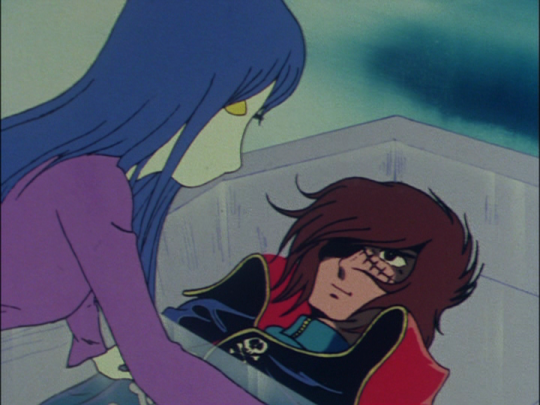
But what truly bonds them? Why do they enjoy one another’s company so thoroughly? Why do they understand and respect each other so fully? What lies behind the simple dignified tenderness they display towards each other? They are not lovers; they display virtually no hint of romantic infatuation or physical attraction. Yet despite retaining their autonomy and personal freedom they still share a certain bond, an intimate relationship which seems to transcend both love and friendship. But this bond is, sadly, rooted in tragedy and grounded by the threefold components of isolation, loneliness and grief.
I: Isolation
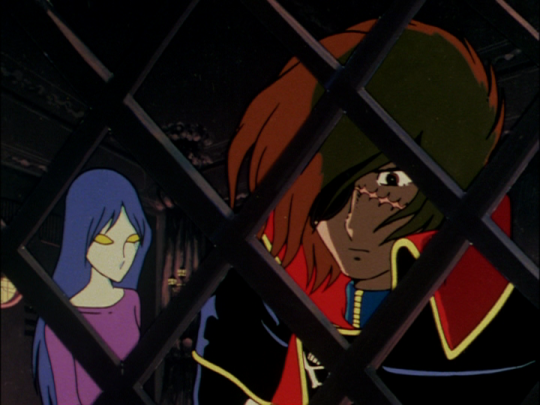
One sad reality of Harlock’s existence is that he is an extremely isolated individual. Although the entire universe is essentially his sandbox and the Arcadia possess enough firepower to level cities and hold off entire alien fleets, Harlock never takes advantage of his considerable power and fearful reputation to make the rest of humanity do his bidding or live according his higher standards. Planet Earth is not a sheltering or welcoming place for the self-exiled space-pirate. Harlock has no wish to dominate, but he will not suffer himself to be dominated, so he endures the derision and scorn of Earth’s rulers and the constant harassment of the planet’s Defense Force with little genuine retaliation, preferring to roam the stars in hopes of finding his ‘final resting place.’ Despite having a homeworld and a people, Harlock, both by choice and circumstance, lives out a solitary and confined existence, with only those few chosen comrades who remain with him in order to fight for their own beliefs and carve out their own paths.
Miime shares in this isolation; for although planet Jura still exists her race has been completely destroyed in nuclear warfare and the following environmental retaliation brought on by the planet’s sentient plant-life. In a brief flash-back, a younger Harlock visits Jura and rescues Miime, now the last Jurian, from the plants and offers her refuge aboard his ship. Not only does Miime owe her life to Harlock, she also is allowed to live on his ship seemingly condition-free. Harlock has no utilitarian motives - neither practical or personal - for keeping her around. Miime does not cook or clean or fly Space Wolves or man any of the Arcadia’s guns; she is not a doctor, a scientist or a navigator. The bulk of Harlock’s otherwise human crew seem mostly indifferent to her presence; they do not compete for her attention or affection, nor do they make advances on her. Even aboard the Arcadia Miime remains in isolation and because Harlock also lives in voluntary isolation, spending most of his time in his elegant sterncastle drinking, brooding and playing his ocarina, their mutual situations and circumstances draw them closer together in a relationship built upon what is missing in their lives rather than what they have in common. They are both unique one-of-a-kind individuals, alone in a cold inhospitable galaxy that has little to offer them in terms of meaning and fulfillment. Even when together, isolation still dominates, for although Miime and Harlock spend a great deal of time alone behind closed doors there is always a significant physical distance between them. Both are heavy drinkers (Miime requires alcohol to survive, as it it is a natural part of her diet; Harlock is an alcoholic), but we never see them genuinely intoxicated and acting stupid, flirty or inappropriate with each other. In their isolation is also their liberty, for being who they are - free, above all things - they are under no obligations or expectations to behave in certain ways. Harlock and Miime have nothing to prove to each other or to anyone else. Their relationship remains fixed and unchanging amid a universe full of chaos, danger and constant strife. They can always rely on one another - their isolation is their safeguard and shield; perhaps it is not such a tragic state after all.
II: Loneliness
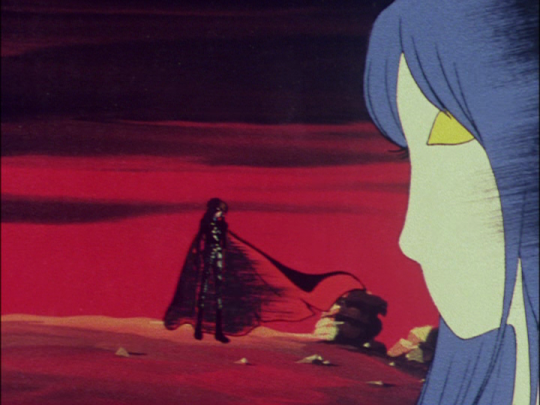
There is - or should be - a distinction drawn between someone who is physically alone and someone who is feeling lonely. For most people, the two aspects are one and the same. If there is no one around you, no one to talk to or interact with in some manner, this will be perceived by most as a negative state, one which they quickly rectify by either calling or visiting friends, chatting online or making plans for family gatherings and meaningful dates with significant others. To be alone with oneself, with ones’s own feelings, thoughts and memories without any distractions for an extended period of time, is hard for most people to handle - for most, but not all. I myself am an unapologetic loner. This is not due to shyness or social ineptness; I am merely extremely introverted. As I write this part of the article I am alone in the house (except for a sleepy old pit-bull) and I love it. This is the main reason I became so attached to Harlock and Emeraldas - they are both loners living according to their own codes and beliefs, following their own paths and perusing their own destinies (2). The Arcadia - which serves the duel purpose of being Harlock’s fortress, safe-haven and tomb - enables him to remain free and unattached to the rest of humanity, liberating him from the confines of mankind’s apathetic degenerate social state and allowing him to remain true to his own self and goals.
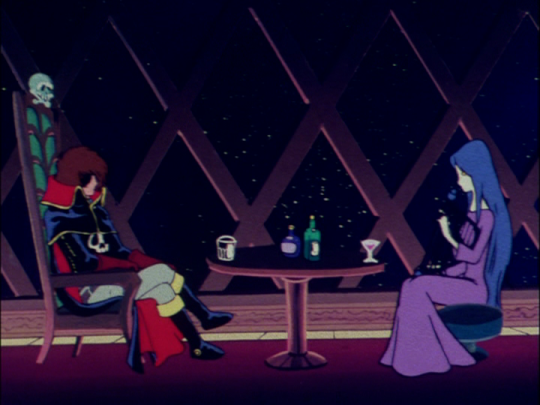
But although Harlock is a true loner and possesses a solitary nature, he still suffers from genuine loneliness from time to time, although the only other human he intentionally seeks out to spend quality time with is Tochiro’s seven-year-old orphaned daughter, Mayu, which he does at his own peril. Miime, on the other hand, suffers loneliness even more keenly. Harlock, at least, can draw comfort (however sparse), in that he actually has a home-planet and a race to protect (even if he wants nothing to do with them), while Miime is the last of her kind - the last Jurian. Her planet still survives but the Jurian civilization is now nothing but ruins overrun by hostile plant-life. There is no going home for her. Her family and friends are all dead. She is a dispossessed being, without home or people, adrift in a hostile universe. In order to alleviate her loneliness she cleaves to Harlock with a single-minded vengeance, offering him her life, going were he goes, aiding him in all the ways she can, never once standing in his way or making demands of him. “It is better to be with people you hate then to be alone,” she tells Harlock, after lamenting how she had hated her people for the destruction they had wrought, only realizing after they were all dead how much she missed them now that she is truly and utterly alone. Her loneliness is made all the more potent in that she cannot truly leave the Arcadia. Harlock’s human crew-mates can leave and return to Earth if they wish but there is nowhere for Miime to go and no reason for her to leave. But she does not view Harlock’s ship has a prison - she learns about its secrets, about Tochiro, and this draws her and Harlock even closer together. Both Harlock and Miime are alone (one mostly by choice, one entirely by circumstance.) but their shared emotional experiences (and their mutual love of wine and music) allow for them to form and maintain a relationship that dulls the pain caused by loneliness (and the isolation) and gives Harlock the space to engage in meaningful interactions with another that brings them both happiness. Loneliness is the driving force that keeps their relationship stable and constant for the entirety of the series. Neither Miime or Harlock take each other for granted. Both remain grateful for what the one does for the other. Loneliness has gifted them to one another, and, because of its overhanging spectre, their bond is further strengthened by the knowledge that what they have is something unique, something valuable, and ultimately, something that neither one dares to compromise - for if that should happen the loneliness would become unbearable and the isolation truly complete.
III: Grief
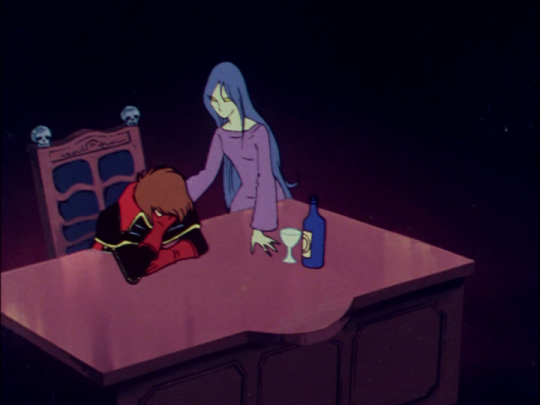
The entire Space Pirate Captain Harlock series is overshadowed by an atmosphere of quiet unshakable melancholy. It rests upon Harlock like a second cape, infusing all his actions and choices, unweakening in its hold on him from the first episode to the last. He is never freed from it, for this is a melancholy born of grief, of loss, and of a seemingly-futile yearning for what can never again be. Harlock is in a perpetual state of unending mourning – he mourns for an Earth whose natural beauty and splendor is fading with each passing year, he mourns for a humanity who has forfeited its dreams and visions of the future so as to live in a state of continuous apathy and sloth; but, above all, he mourns for the loss of his best friend, the man who never gave up hope either in humanity, the future, or even Harlock himself. Tochiro Oyama is dead (except in two flash-back episodes), and without that that spunky, optimistic genius-engineer at his side, Harlock’s natural inclinations towards pessimism and depression must be battled at every turn if he is to remain an effective apposing force in the fight against the Mazone. Harlock speaks in passing about ‘looking for a final resting place’ and about spending ‘a life wandering space, looking for a place to die.’ Harlock is a less hopeful and forgiving man then Tochiro, and is tempted often to abandon mankind and the Earth to its fate. But to abandon either of these things is, in effect, to abandon Tochiro himself, especially as his only child, Mayu, lives in an orphanage on Earth. To turn his back upon the planet and its people is to turn his back on Tochiro and his heirs and to scorn his friend’s dream of a better future. Almost against his will, Harlock denies Mazone Queen Lafresia the earth for Tochiro and Mayu’s sake, if nothing else, though he does wish to prove to humanity (who view him as a disruptive, peace-threatening menace to society) that he can and will protect them, regardless of his own negative feelings (or theirs). Prior to the Mazone’s arrival, Harlock lived a listless, goalless life of petty piracy, protected and entombed in a semi-haunted Arcadia infused with the soul and living brain-cells of Tochiro himself. His war with Queen Lafresia gives him a purpose again and rekindles his fighting spirit, but even when victory is achieved Harlock refuses to remain on earth; instead he self-exiles himself once more, leaving his entire crew behind, to continue wandering the stars - but this time, only Miime is allowed to accompany him.
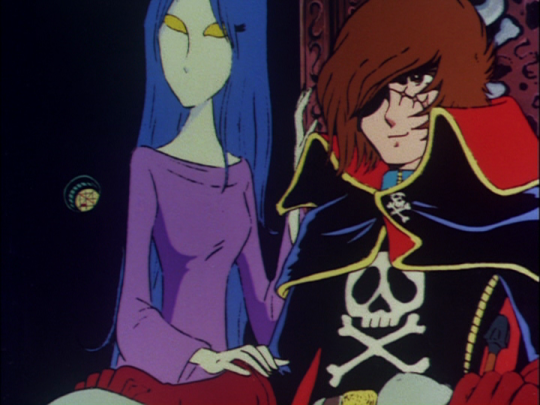
If Miime is dominated by her loneliness (and her literal ‘alone-ness’) then Harlock is ruled by his grief; no-one, not Miime, Tadashi or even Mayu, can take the place Tochiro holds in his heart. Harlock does not desire wealth, fame, acclamation, status as a hero or even to be respected and appreciated. He fights successfully to secure a future for the Earth but he cannot be apart of that future – for Harlock desires only the Arcadia of his youth, his past life with Tochiro, the long-ago days when it was just two carefree young men seeking to live free and pursue their dreams. But those times of youth and adventure cannot be reclaimed. Tochiro is dead (though still present) and Harlock can do nothing but carry on without him. He keeps Miime at his side, and she follows him willingly into the dark and to whatever fate awaits them. Earth may have been saved and mankind given a second chance, but for Harlock, Miime and Tochiro there is no going back home. Home does not exist for them anymore. Their only true home now is the Sea of Stars, their only banner the Jolly-Roger, and a life lived in freedom their only sustenance. Miime vanishes with Harlock into the vastness of space, remaining loyal to him to the last, even as Harlock remained loyal to Tochiro’s dream, the three of them uplifting and sustaining one another in their long exile. It is not necessarily a happy ending, but it is certainly a fitting one, appropriate to the nature of its characters and in keeping with the series’ overall mood and tone.
Thus wherever Harlock may go, Miime will always be at his side, a true companion he can rely upon for comfort and advice. For Miime, Harlock will always remain her savior and provider, and her comfort and advice are gladly given, since they both retain their freedom - which is, ultimately, all they ask for and in the end, as long as they remain within the confines of the Arcadia, is all they are allowed to have.
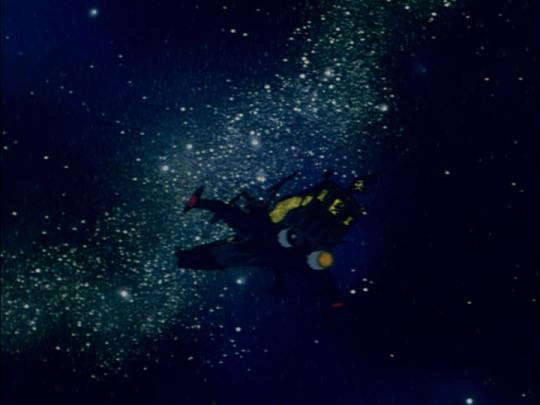
(1) You can only imagine how pissed-off I was when in the 2013 Space Pirate Captain Harlock CGI film, after Yama replaces Harlock as captain, Space-Elf!Miime declares that her loyalty is to the ship rather than Harlock himself. Boy that made me mad - that among so many other things.
(2) Harlock’s, Emeraldas’s and my own personality traits in a nutshell.
#Captain Harlock#Miime#Harlock article#Space Pirate Captain Harlock#screenshots#leiji matsumoto#leijiverse
55 notes
·
View notes
Note
Hello Emily!!! I was just wondering what’s your opinion on Cheryl🤔
Well hello, my lovely! That sounds like a mighty controversial question to ask, lol. But, I mean, I obviously have to preface this by saying my opinion is just that; an opinion. And it may not be as glowing an opinion as some may have of her, but that’s fine. Those people that love her can love her relentlessly, as much as I could not. So, don’t take my opinion as gospel. Please. But be warned; It’s probably not gonna be all positive, if I’m being honest. So, read on at your own choosing.
Anywho, to answer your question; I don’t really care much one way or another about her? I think like most of us, i hadn’t known of her much until the last few (5-7) years. Although I probably grew up during her musical hey days, her music (group nor solo-wise) hadn’t really reached much of the US, much less to my musical airwaves. So, musically, I suppose I’m indifferent? I think, in terms of her musicality, she’s a much stronger dancer/performer than ‘singer’. Her type of artistry, from what I’ve accumulated from videos and such, is a little predated to an earlier 2000′s feel, where stage theatrics took presence over vocals. I’m not saying she cant sing; I’m simply saying *I* see her tactic and drive as an artist is to ‘put on a show’ with a heavy presence of dancing rather than sing solely with the drive being vocal. She’s alright, and I hope she navigates her musical career how she wants to, fulfillingly. BUT….I’m not particularly all that intrigued in her music myself.
Regarding her with Liam, which is why I assume you asked me my opinion on her to begin with, isn’t the most stellar. I’m just gonna be honest with yall; I’m not keen. So, if we’re looking for some Cherliam on my blog, you probably wont find much. Sorry, lol. I just get a rather odd feeling regarding them. Which means NOTHING in the grand scheme of things, because honestly? I’m sure they could care less about my opinion; they’re still living their lives, together, how they choose so. Bear sound like a sweet boy, and is loved by his parents. So that’s all I can ask for with them. Other than that, I’m not personally a fan of them together. And I’m sure we’ve all heard one reason or another why. But that’s all just a matter of opinion and how we view relationships, I guess. I mean…I don’t much care for Zigi either. So…don’t take it personally. I just don’t vibe with it.
However, i will say I haven’t been introduced the best impression of Cheryl. I don’t share this follwing stuff because I have some personal, mean girl vendetta against her, but…Some of the things I’ve seen regarding her aren’t…the best. And full disclosure: Yes, I know we all have spotty pasts where we didn’t exhibit the best judgement. Is Cheryl allowed to grow as a person? Yes. And I have no interest in going out of my way to hurt or attack her directly; I don’t care enough about her to. BUT, I had a conversation with a friend who was a bit disturbed to hear about issues she was involved with in her past. And yes, i think we all know what one of those topics is…
I think it is fully fair to acknowledge that some of the things she’s done in the past are unacceptable, or not condonable, at the least. And if people find personal disapproval or problems with things she’s done, that’s fully understandable, and needs to be respected. I know this could get me into trouble with her diehard fans, but if someone is disturbed by her past of physical aggression, i think that’s very justifiable to understand and acknowledge that some people do not like what she’s done, simply put. I think we’ve all heard of the bathroom attendant story. And yes, full disclosure; it’s in the past and I’m sure (hoping) she’s definitely learned her lesson not to get drunk off her ass like that again. Additionally, I know that situation in particular is a very big, divisive one that people either strongly defend, or strongly argue against. I cant say I know what’s certain regarding that altercation, but all I can say is that the photo of the victim of the assault is….bad. Fair warning: the photo could be graphic for some.

Although Chez claimed she ‘hit back in self-defense’, the injuries claimed to be sustained by the victim look a little bit more than just ‘defensive’, considering there was hardly a scratch on Cheryl. There’s no way around disputing that. You can see it for yourself. Furthermore, she said in her book that,

I don’t know what about THAT is ‘scot-free‘, but I digress. Regardless of the little details here or there about their differing stories, being seeing as ‘not guilty’ doesn’t mean ‘innocent’. This is one altercation that is used against her a lot. And yes, some use it in the wrong way as ammunition to fuel arguments about why they personally ‘hate’ Cheryl, but others simply feel it’s important to discuss, because it’s not the first or last time she had been aggressive with someone. She’s also admitted HERSELF that she’s been physical towards ex-partners too. She claims that she was raised to ‘stand up for herself’, and that her brothers taught her to fight, essentially. And I would fully agree with that being a reasonable means of action to physically protect yourself. But when it comes to the situations that occurred with her past partners, it didn’t seem to be of self-defense, in my personal opinion, but rather an irrational impulse.
While I DO agree her ex-partners are utter shitbags and she had reasons to be upset, I don’t personally believe it’s okay to lay hands on ANYONE; unless you are being physically assaulted against your will initially, then I fully understand and support self-defense. But that’s seemingly not the case regarding these situations. She describes an ex-boyfriend as being a severe drug abuser. As I said before, I’m not saying her ex-boyfriends are saints and without issue; I personally wouldn’t accept my partner abusing hard drugs either. But something about how casually she explains physically hitting him out of anger is…unsettling.

She later on had a big scandal involving her ex-husband, as I’m sure some already know. Again, a cheating husband is absolutely trash, and disgusting. So I feel no emotional sympathy for him when it comes to his decision to cheat. And on an emotional level, I really do feel for her regarding that. But I really and truly cannot tell you guys I condone physical violence, especially in regards to relationships. At that moment, she made a really bad decision to lash out how she did. And i haven’t a clue why she would publish this information, cause it certainly doesn’t paint her in a *good* light?

Now, whatever opinion you may have about relationship issues, that’s your opinion, and that’s fine. But I cant lie to you guys and say I’m okay with one person doing this to their partner. Doesn’t matter who that partner is, or whether it’s a girl to a guy, a guy to a girl, or anything in between. It’s not acceptable to me, and I hope you guys can understand why some people can be extremely upset about stuff like this regarding Cheryl. This isn’t meant to be a rallying cry to bash Cheryl, no. I was asked how I felt about her, and I was gonna be honest to include things that upset me, and others, about her. It’s okay for Cheryl fans to admit her faults, and its okay for non-fans to admit she has made mistakes in her past that she can, and probably has, learned from. That was the sole purpose bringing up those talking points.
I'm sorry this went on a slight bit of a tangent, and that it may not have been as passive and positive as some may have expected me to answer, but...It’s honest, and my opinion. I'm sure there are some great qualities about Cheryl; she can be wonderfully charitable and that is one thing I can say is admirable about her. I like that. And I hope she continues to do good, philanthropic work. She’s obviously a gorgeous woman, with friends and family that love her, and fans who adore and support her. That’s wonderful, really. Though she may not be a person I'm incredibly fond of, I do still wish her well. I hope she continues to grow from her mistakes, and that she leads a more wholesome life. Whatever criticism was said about her is only meant to show that we’re not without flaws. And I absolutely understand friends and followers who may not appreciate some of the bad things she’s done in the past. As for her life now, she leads a much better one that is better to se. I'm sorry if this wasn't the best response to your question, but I hope it was okay. If someone disagrees with me about anything written, that’s fine, and I respect your opinion completely. But i have no interest in having discourse back and forth, so...I've said my peace, and keeping it at that. I appreciate your ask, darling. Thank You! :)
8 notes
·
View notes
Text
Psychological Flexibility
We all want love. Meaning. Wholeness. Joy. These things don’t come easily to us. Why is that? Why do we struggle so much? The answer, for Steven Hayes and his colleagues, rests in a small set of skills that enhance our capacity for psychological flexibility.
Psychological flexibility, Hayes says, is
‘the ability to feel and think with openness, to attend voluntarily to your experience of the present moment, and to move your life in directions that are important to you, building habits that allow you to live life in accordance with your values and aspirations.’[1]
The opposite of psychological flexibility is psychological rigidity – patterns of avoidance and evasion, turning away from the things that are painful in our lives both when they happen as well as in our memory of them. Hayes describes the way we ultimately end up amplifying our pain through disappearing into rumination, worry, distraction, self-stimulation, work without end and other forms of mindlessness in our attempts to evade the pain we’re feeling.
Part of the reason we do this so regularly is because our minds have a “feel good” agenda that channels our best problem-solving capacities towards this goal. Our biology even rewards our avoidant behaviour by releasing the same chemicals that mark the receipt of a positive reward any time we evade a difficult or challenging situation.[2] The problem is that the instant gratification of avoidance only tricks us into trading away our own future: we choose short-term fixes over our long-term aims. We trade our birthrights for a comforting, distracting bowl of soup.
In these attempts to avoid our pain we ourselves become numb. We no longer experience our experience. We don’t feel our pain (directly) but neither do we feel our joy (we don’t have the option of selectively numbing our feelings).
We lose access to the things that we care about most in the world because ‘the things that have the power to cause us the most pain are often the things we care about most deeply.’[3]
Our psychological rigidity keeps our deepest yearnings and most powerful motivations hidden within our unhelpful defense mechanisms. We thought these defense systems were keeping us safe and sound but what really happens is that we merely frustrate our most human desires for meaning and insight, for belonging and connection, to feel and to navigate our way through our experiences with purpose, energy and confidence.
Psychological flexibility is about learning a new way – turning toward your suffering with full openness and awareness in order to live a life full of meaning and purpose. It is a way of being that senses the futility of our avoidant behaviours and allows human beings to recognise that pain can be an ally revealing what really matters to us.
‘You hurt where you care, and you care where you hurt.’[4]
Consider anything in life anything truly worth doing in life - parenting, vocation, relationships and so on - they all come with difficult thoughts and feelings. Psychological flexibility isn’t about trying to eliminate or avoid those feelings; it’s about creating more flexibility in how to live with them and to respond to them. As other practitioners describe, psychological flexibility is the ability to be present, open up, and to do what matters.[5]
Over the last thirty-five years, Hayes and his colleagues have been able to determine through their research and practice six mental processes/skills that determine how the shape of our lives will unfold than any other single set of mental and behavioural processes previously known to science [6]. Hayes calls them flexibility pivots that allow us to redirect our hidden yearnings towards a more open and flexible way of being that actually satisfy the yearning:
1. From Cognitive Fusion to Defusion
Seeing our thoughts with enough distance that we can choose what we do next, regardless of our mind’s chatter.
2. From Allegiance to a Conceptualised Sense of Self to a Perspective-Taking Self
Noticing the story we’ve constructed of ourselves and gaining perspective about who we are.
3. From Experiential Avoidance to Acceptance
Allowing ourselves to feel even when the feelings are painful or create a sense of vulnerability.
4. From Rigid Attention Driven by the Past and Future to Flexible Attention in the Now (Presence)
Directing attention in an intentional way rather than by mere habit, noticing what is present here and now, inside us and out.
5. From Socially Compliant Goals to Chosen Values
Choosing the qualities of being and doing that we want to move towards.
6. From Avoidant Persistence to Committed Action
Creating habits that support these choices.[7]
Increasing psychological flexibility through these pivots is the main goal of Acceptance and Commitment therapy (ACT). Ultimately psychological flexibility is about inviting a healthy process of change in aid of creating more loving and empowered environments at home, at work, in our communities, and in our hearts.[8] Who doesn’t want that? Fortunately Hayes reminds us that dramatic change is possible. We can learn the skills that stop us avoiding. We can back away from our minds and the rigid stories our minds tell us about who are and how we should live. We can embrace awareness. We can turn towards what really matters to us, walking in that direction even with our difficult thoughts, feelings and memories coming along with us for the ride.
Steven Hayes story of his own journey towards psychological flexibility can be viewed here.
[1] Steven Hayes, A Liberated Mind: The Essential Guide to ACT (2019), p.5
[2] Ibid.,p.97
[3] Ibid., p,5
[4] Ibid., p.24
[5] Russ Harris, ACT Made Simple (2009), p.12
[6] ‘In over one thousand studies, we’ve found that these skills help determine why some people thrive after life challenges and some don’t, or why some people experience many positive emotions (joy, gratitude, compassion, curiosity) and others very few. They predict who is going to develop a mental health problem such as anxiety, depression, trauma, or substance abuse, and how severe or long-lasting the problem will be. These skills predict who will be effective at work, who will have healthy relationships, who will succeed in dieting or exercise, who will rise to the challenges of physical disease, how people will do in athletic competition, and how they will perform in many other areas of human endeavour.’ (Hayes, p.5)
[7] Ibid., pp.19-23
[8] Ibid., p.28
0 notes
Photo
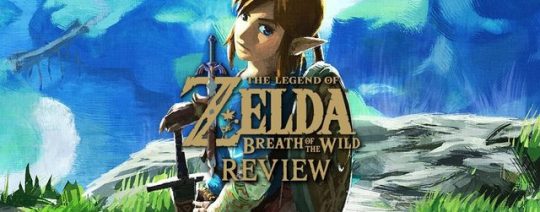
Game Review: The Legend of Zelda: Breath of the Wild (2017)
The Legend of Zelda: Breath of the Wild might just be one of the best games Nintendo has ever made. Ever. Is that too hyperbolic? Should I reign it in a little?
So where does that put us? The Nintendo game I hold in the highest regard is Super Mario 64, which on top of just being a really good game, basically defined 3D character movement for the entire game industry. Everything from Uncharted to Grand Theft Auto and NieR Automata owes something to Super Mario 64 for establishing how to use an analog stick to control the action on screen. It was a revolution.
Breath of the Wild isn’t a revolution. This is a game cut from the same cloth as Skyrim or The Witcher 3 — an open-world fantasy game, with towns full of people and quest logs designed to distract. You’ve technically seen this game before, or at least parts of it, and on the surface it can be easy to brush it off as nothing more than a thinly veiled “me too” clone by way of The Legend of Zelda.
But here’s the deal: you’ve never played Nintendo’s version of this. Those other games I mentioned often prioritize production quality and narrative depth. A quest’s story in my examples is often more important than what you actually have to do in it, with the worst example being multiple quests in Skyrim that send you from one edge of the map miles away to the other edge just to kill a single enemy and then hike the entire distance back for your reward. Even on horseback, a quest like that would take hours of mind-numbing transit. The obvious (and likely intended) solution is to use the game’s fast travel system to teleport to the destination, complete the objective, and then teleport back, turning an all-day gameplay excursion into a something that takes less than 15 minutes. The problem is that this creates a disconnect where everything stops feeling real, because there’s no reaffirmation that these are places that exist. You come to view the world as nothing more than a piece of software that lets you materialize at your destination. There’s no sense of distance, no journey.
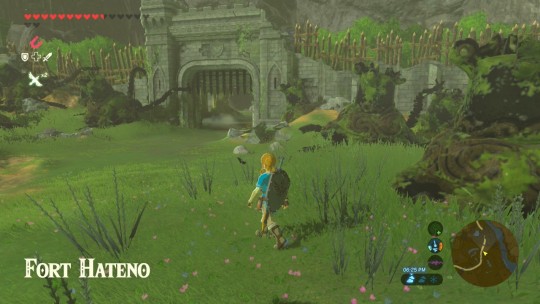
That’s simply not true with Breath of the Wild, which goes out of its way to make you feel like a part of the land of Hyrule. Not only does it feel like a real, lived-in space, it feels like one with thousands of years of tangible history. Ruins of what used to be litter the land, some more recent than others, but all purpose-built with a legacy of their own. The environment of Hyrule is as much a character here as anyone else, and its battle-scarred vistas tell a lonely, somber tale.
Zelda is one of Nintendo’s most narrative-rich franchises, which allows it to slip into Skyrim’s skin with ease. Just the same, Breath of the Wild is a game about journeys. It’s a game where you look over your shoulder and think: an hour ago, I was on top of that mountain. I have come so far, done so much, and seen so many things. Yes, it has fast travel and horse riding if you really need to get somewhere quickly. But why would you? Breath of the Wild is a game where there’s always something on the horizon calling out to you. Horses and fast travel might get you in the general vicinity of where you want to go, but never close enough. Eventually you have to take matters into your own hands (often literally) and venture forth by yourself to discover Hyrule’s mysteries, one cliff face at a time. Literally the entire point of this game is to meticulously sift through the world inch by inch, and it manages to feel like magic basically the entire time.
You also connect to this world in other ways. Breath of the Wild features surprisingly robust artificial intelligence and physics systems, and you’re given tools perfect for playing around in this space. Rather than acquire a stable of items from dungeons (as in past Zelda games), Breath of the Wild gives you five core abilities during its tutorial and then turns you loose on the world to use them as you please. Unlike, say, Ocarina of Time’s hookshot, which could only be used on specific hookshot targets, these five abilities are far more utilitarian in their approach. They allow you to interact with the environment in ways most open world games shy away from, like picking up physics objects or generating platforms over tricky terrain. In addition to helping you solve puzzles and navigate the world, many of these abilities have combat applications, leading to fun games of cat and mouse with Ganon’s minions.
In one particular example, I came upon a camp of pig-like Bokoblins that had set up inside the ruins of an old building. I had mostly cleared the place out, but there was still one lone Boko on patrol outside completely unaware of what had happened to the rest of the camp. From the door, he peered inside. Bokoblins don’t have great eyesight, so from the distance he was at, he didn’t really have a chance to identify me before I darted out of sight. He obviously knew he saw something suspicious, so he walked over, grabbed a club from the camp’s weapons pile outside, and then headed inside the ruins to investigate. By this point, I’d climbed on top of the ruins and was watching him from what would be the roof, if this building had one (it did not). He headed to the last place he saw me and sniffed around, hoping to figure out what he’d seen. By now his back was turned to me, so I jumped from my vantage point above him and came down on his head with my spear for a quick kill. This kind of emergent gameplay is a first for The Legend of Zelda, and it makes every combat encounter feel unique.
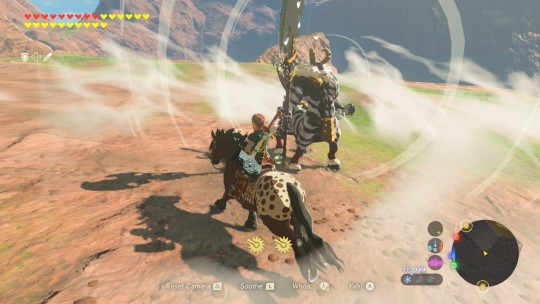
Perhaps Breath of the Wild’s greatest strength is its willingness to embrace this kind of emergent player expression. Nintendo could have very easily locked a lot of its puzzles and encounters down, discouraging all but the one “true” solution, but they didn’t. It brings to mind the elements that made a game like Minecraft so captivating; the only thing stopping you from getting somewhere or doing something is your own ingenuity. Nothing in the game ever has just one solution, and it fully embraces whatever ways you can find to bend its rules. Previous Zeldas were full of jigsaw puzzles that had to be assembled in the same way every single time. Breath of the Wild is more of an actual test of problem solving skills, and one where my answer might be different from your answer and neither one of us is wrong.
Of course, even the best games have their flaws, and Breath of the Wild is definitely not a perfect game. In particular is the game’s performance — I played on the Wii U, and there, Breath of the Wild suffers occasional choppy framerates and sometimes more significant stuttering. Knocking down a Moblin can sometimes make the whole game freeze for up to two full seconds. Zelda is undoubtedly simulating a lot of stuff behind the scenes, between physics, climate systems, fire propagation, and artificial intelligence, so it’s understandable when the game threatens to buckle under it’s own weight, but it’s still a problem worth talking about. My understanding is that the Switch version is also affected by many of these technical issues, but with less severity. But, even on the Wii U, I found them to be momentary annoyances and not anything to really cast the game in a negative light. For 75% of my time in Hyrule, the game performed just fine (and it’s worth mentioning that during the process of writing this review, Nintendo published a patch for Zelda that optimizes the game just a little bit more to reduce framerate drops).
The other elephant in the room deals the game’s systems, particularly in weapon durability and weather. If you use a given weapon too much, it will eventually shatter. Often, I’d leave a combat encounter with fewer or worse weapons than when I started, but once I learned not to get too attached to any given sword, shield or bow, it ceased to be an issue. Breath of the Wild is a game about making do with what you’ve got and building an ever-changing strategy around that. Enemies also scale in strength over time, providing you with a drip feed of slightly more powerful gear as you play. That being said, the game definitely could have benefited from ways to repair fragile weapons, because just about everything breaks after only a few minutes of use.
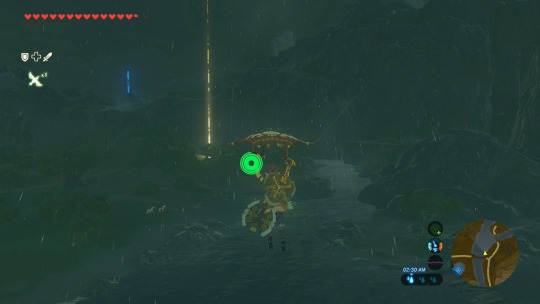
Weather, on the other hand, was probably the single biggest point of frustration for me in Breath of the Wild. You’re given an on-screen weather forecast, presumably so you can plan accordingly should something like rain come up, but sometimes it can be unpredictable as you move through the world and suddenly shift into a new biome with different weather patterns. In one particularly ridiculous scenario, I found myself stranded on a rocky alcove because if I climbed up even ten feet it would trigger a biome change and begin raining, making it too slick to continue upwards. The moment I’d drop off the cliff (or more likely slip off), the rain would suddenly vanish. Sometimes, it doesn’t make any logical sense at all, such as the time I had to light fires as part of a quest and it began raining just long enough (about six seconds) to snuff out my flames and make me start over. Nothing in the forecast called for rain, nothing on my HUD changed, it just started pouring rain and then instantly stopped. You very quickly learn to dread rainstorms, because there’s not a lot you can do about them except wait for the weather to clear.
Regardless, these problems barely register as a blip on the game’s radar. I know it can be easy to sometimes get frustrated with Nintendo’s output and design philosophies, specifically with regards to past Zelda games like Twilight Princess and Skyward Sword, but when this company pulls together and fires on all cylinders, the end result is something truly incredible to behold. Breath of the Wild is a tremendous game; even after finishing the game and putting in more than 140 hours, I wasn’t ready to leave Hyrule. I was still finding new discoveries. New places I hadn’t been to yet. No game that I can ever remember playing in the 30+ years since the NES has gotten its hooks into me this deep for this long. It may not be a revolution, but with Breath of the Wild, Nintendo has still run circles around the industry just the same. Under no circumstances should you allow yourself to miss this game.

2 notes
·
View notes
Text
Emotions
I’ve always been a sensitive soul and felt things deeply, but growing up in a Caribbean household, expressing emotions wasn’t the norm. There was love, but not in ways that I resonated with. There were no family congregations like in the TV sitcoms, hugs or even moments of vulnerability. The words “I love you” would mostly be expressed via birthday or Christmas cards, and a safe space to vocalize my day to day challenges as a young human navigating this complicated thing called life was nonexistent. Consequently, I suppressed everything. I became non expressive until i’d reach a breaking point resulting in an explosion. I felt alone, confused, and disconnected from everything and everyone. I was living out of alignment because I didn’t have a point of reference to demonstrate what healthy expression looked like. Unconsciously, I had made an agreement with myself to keep it all in so that I wouldn’t appear crazy or needy. I had no voice. So, at the tender age of 12, my solution was to seek love and acceptance in ALL the wrong places. And by the age of 18, I’d indulge in weed and alcohol as a numbing tactic.
But it didn’t work.
“So what if I’m a mess? I’d rather be a mess than be in resistance to it.”
-Divine
Eventually, I reached a place where I felt so uneasy within myself. The emotions I was carrying felt so heavy, and so complex. When the weed no longer suppressed my demons, I knew a change needed to happen. But I wouldn’t invite that change on my own. I needed motivation. I needed a push, for lack of a better word. The push to better understand and express my emotions was a horrific heartbreak that left me feeling so alone, so confused and so disconnected from everything and everyone (sound familiar?) What I didn’t realize at the time was that this situation was actually the catalyst to my rebirth.I felt so much shame, unworthiness and defeat by the people who were supposed to love me. But i get it now. Sometimes in order for us to move and make a change, we have to be pissed the fuck off; we have to reach a point where we can no longer survive with the same mindset that lead us to this place.
This was my rock bottom.
Expressing our emotions is not a sign of weakness but instead a sign of strength
What I’ve discovered along my journey is that our emotions play an important role in our lives. They are our teachers. I am learning to see my emotions not as a hindrance, but rather a tool to get more into alignment with myself, thus get more into alignment with God consciousness. Difficult emotions tell me that something is wrong, whether it be my own thoughts that create this feeling, or my environment or even circumstances. Regardless of the root of the negative feeling, the emotion is signaling for me to make a change. According to manifestation coach, Abraham Hicks, our emotions are a physical manifestation of whether we are in alignment or not. When we feel good, this is a physical manifestation of being in alignment with our soul self. Negative emotions, however, are a sign that we have strayed away from the truth of who we are.
“Let your pain propel you into your purpose” – Solaris the hii priestess
The “normal” reaction to heavy or difficult emotions is to hurry up and do something to counter that negative feeling. We get our hearts broken and rush to pursue another partner. We lose our job and immediately put ourselves out there to find a replacement. We feel sad, so we go out turn up and numb everything to avoid feeling. We completely skip the grieving process (oh, and it is a process) and move on with life as if these events don’t impact us in every way imaginable.
We can also trick ourselves into thinking that we are healing with spirituality and self-care rituals. So, we overly immerse ourselves in books, yoga, massages, traveling, juicing or any other “healing” activity that promises us freedom. Though these activities are extremely helpful for healing and coping, it is absolutely possible that we’d use them as another form of escapism. Or in laymen terms, another way to avoid actually sitting with our feelings.
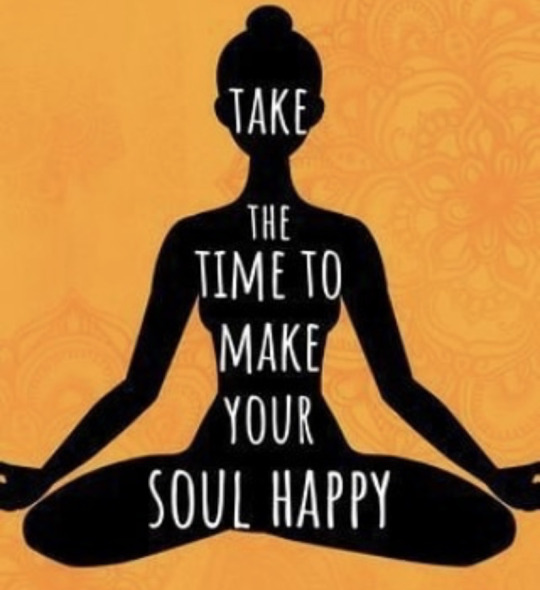
When we give ourselves permission to feel our feelings, we are letting go of old patterns, beliefs, and ideas of how life should be and creating space for new and better experiences. It’s uncomfortable because our identities, our perceptions, and our entire world view is being challenged. But despite navigating emotions being hard work and often feeling depleting, it’s important to our evolution; it’s our soul communicating with us about what feels authentic and what feels inauthentic in our lives.
I’m really beginning to comprehend that the only way out is through. One cannot stretch it away, read it away, sex it away, or drink it away. (Solange be knowin) The only way to truly understand our emotions is to sit with them. To sit with the achy feeling and investigate the root of our hurt, which many times derived in childhood.
Emotions = Energy in motion
Our emotions serve as a compass which leads us in the direction of fulfillment, but they are not all that we are. Uncomfortable emotions are not fact nor do the define us. When difficult emotions come up, it’s important that we remember that we always have a choice of what to do with them. That might be journaling, that might crying, or leaning into our creative endeavors. That might be movement, solitude or doing absolutely nothing. What has helped me is to not only acknowledge my emotions and see them as valid, but to also use my emotions as fuel in ways that are progressive rather than destructive. And when all else fails, I find comfort and solace by coming into the present moment.
Gratitude
When we engage all of our senses and observe where we are, how we feel, and what we see, we find that gratitude comes naturally. Gratitude for our life, for our health, for the trees, or even for those hurtful experiences that make us wiser. A little gratitude goes a long way. And when we become fully engulfed in the present moment, we realize that everything that has happened in the past no longer exists and that the future has yet to come. It is in the present moment that we see that even though pain is a byproduct of our human experience, suffering is a choice. Accepting and surrendering to life as it is is a porcess.Sometimes a process that we have to revisit over and over and over again until enough time has passed for the pain to subside.It isn’t always love and light, allot of the time it feels messy and painful.
But that’s ok.
“Pain is what it took to teach me to pay attention. In times of pain, when the future is too terrifying to contemplate and the past is too painful to remember, I have learned to pay attention to right now. The precise moment I was in was always the only safe place for me. Each moment, taken alone, was always bearable. In the exact now, we are all, always, alright. Yesterday the marriage may have ended. Tomorrow the cat may die. The phone call from the lover, for all my waiting, may not ever come, but just at the moment, just now, that’s all right. I am breathing in and out. Realizing this, I began to realize that each moment was not without it’s beauty.” -Julia Cameron
The work is in embracing our feelings, seeing them as valid, investiagting what they may be teaching us and letting it all go to create space to let happiness in.Pain is not meant to be hoarded, its purpose is to guide us in the direction of self preservation and self evolution.
-Divine
#blogger#self care blog#self love#emotions#emotional intelligence#self awareness#self love blog#writer
0 notes
Text
[Fic] “How Easy All Can See” - Chronicles of Narnia
This is not the id!fic prompt! That's going to take more serious work, so I figured I'd jump ahead in the queue and write something a little less emotionally fraught (and also less structurally complicated).
---------------
priscipixie said: How about this: Ilgamuth/Shezan, "heart on sleeve", Shezan has just heard of the defeat at Anvard (really, I'd be happy with anything at all about Shezan and Ilgamuth!)
Note: This ended up as Ilgamuth and Rabadash rather than Ilgamuth and Shezan. Oops? I mean, it's still about Shezan and Ilgamuth, and them being obviously in love. It just kind of... went sideways on me and this is what wanted to be written. It's not exactly a shovel talk, but it sort of flirts in and around that trope, so. (1,200 words)
(The aftermath of Anvard will be part of "A Change of Season," whenever I finally get around to writing that story, so I didn't want to lock myself into something that would inevitably get overwritten later.)
--------------------------------------------- How Easy All Can See ---------------------------------------------
"My milk-sister's heart is her own to guard," Rabadash said as he swung down from his stallion and led the bay horse, gleaming with sweat, down to the bank of the Shirush to drink.
Beside him, keeping a close watch on his own mare as she drank, Ilgamuth swallowed any outward reaction. He had known since Rabadash singled him out for a private race (which Ilgamuth had carefully lost by half a length) that the prince was in a chancy mood. It was best not to answer until he had a better sense of today's grievance.
"You keep your thoughts silent as fog or stone," the prince continued without bothering to face Ilgamuth, "but when you have chewed them over more times than a peasant's cow chews her yellowed grass and decide at last to act, you are not subtle. A man who allows others to see the strength of his craving for a woman, who allows her to become a weak link in his armor or he in hers, is a fool lower than the fleas that plague starving dogs. Malindra Takhun remarked on the value of your courting gift purchases when we passed outside my father's rooms this morning. I have heard similar words in the temples."
Rabadash rested one hand on the heated arch of his stallion's neck, stroked firmly along the grain of the damp hair, and laughed when the horse raised his head from the river to snort a watery question toward the prince's thigh. "A little more, O king of the storm," he said to the stallion. "A little more, but only so much as I will." The horse snorted again, but lowered his head once more to drink.
Ilgamuth tugged lightly on his mare's reins, and she raised her head in turn, stepping back from the river's edge. He had bought Shezan's courting gifts honestly, with crescents saved over years of Rabadash's careless favors. But whispers of bribery and corruption could travel faster than any truth, and he cursed himself for failing to consider that Rishti Tisroc's (may he live forever) court both could and would twist what should be an uncomplicated joy into a field of covert battle.
"Your discernment humbles me as always, O my prince," he said.
Rabadash laughed again, and finally turned to fix Ilgamuth with a stare like the sun reflected on tempered steel. "Shezan's heart, as I have said, is her own. She can and has redressed her own grievances; she will do so again should the need arise. And I am not best pleased with her since she opened the door to her goddess's meddling at the Spring Festival these two weeks past. But she is still my milk-sister, and so I tell you that when the ambassadors finish their fluttering and flatteries and I depart for Narnia, you will be among the party who accompany me, for however long that farce may take. This is not a favor."
"To hear is to obey," Ilgamuth said.
Rabadash did not release his gaze. "As it should be. And should you fail to learn discretion, Ilgamuth of the Twisted Lip, Ilgamuth of my most trusted companions -- should you continue to wear your heart on your sleeve for all to see and weave into their own plans -- I will have other orders for you to obey. You will not like them. Shezan will not either. But I consider her life and her position as Tolkheera more important than a trifling moment of misguided pleasure before the jackals of my father's court strip her flesh from her bones."
"I would gladly give my life for hers, as I would for you, O my prince," Ilgamuth said. He thought of the weeks before the Spring Festival, the helpless, sapping weight of knowing his prince's plans would rip the empire in two yet lacking the courage to speak against the intended blasphemy and patricide. He thought of Shezan's forgiveness, and the weight of her trust when she confided her own fear of Rabadash's growing recklessness and rage: equally heavy, but this time warm and strengthening to bear.
She had pulled something very like victory from the jaws of Rabadash's disaster, regardless of how she tried to shift all credit to the gods. Ilgamuth chose to trust that she could do so again in this smaller, more personal skirmish.
He licked his lips, conscious of the pull of his scarred cheek in a way he could usually ignore, and continued. "I most humbly suggest, however, that the granddaughter of Axartha Tarkaan knows well how to find the water of truth amid the sands of deception, for is it not said that to those with wisdom, even the sandstorm is as clear and tranquil air, through which the fixed stars may shine to guide their path. If she chose me, she must surely have weighed the worth of my heart and woven her own plans to account for its failings."
For a long moment, Rabadash was silent. The quiet shush of the river around buried rocks, the rustle of wind through the tall grass and reeds, the distant complaints of birds, the jingle of the horses' tack as they shifted -- these common, background sounds seemed to grow louder and louder, until they nearly drowned out the racing beat of Ilgamuth's own pulse.
Then Rabadash turned and tugged his stallion's head from the river. The horse stamped his feet, displeased at having his refreshment cut short. But he obeyed, and shifted his fore-hooves back onto solid ground as Rabadash began to walk up the bank.
"You are not subtle," the prince said. "But perhaps that very lack will make you as apt a blade in my sister's hand as you have been in mine -- assuming I find no further flaws in your metal before I give you leave to continue courting her. Do not visit her again until we return from the North."
"To hear is to obey," Ilgamuth said again.
Rabadash swung into his saddle and looked down at Ilgamuth with that shining steel gaze. "Don't make me remind you again," he said, and dug his heels into the stallion's flanks, turning the horse eastward toward Tashbaan and the sea.
Ilgamuth mounted his own mare and followed his prince back to their companions in silence, already composing words in his mind.
He would not visit Shezan. Nor would he send another courting gift. But the prince had said nothing about letters, and a man whose obedience mirrored that of a dog was unworthy to serve anyone or anything, from a lover to a lord to an empire.
Perhaps he would never be subtle, too caught up in his own mind to navigate the hidden currents of the Tisroc's court (or even, at times, his prince's companions). Perhaps he would always be a weight around Shezan's neck, a cord around her ankle. But she had chosen him, as he had chosen her, and he could not find it in his heart to care if the whole world saw his love and counted it a weakness rather than the strength it truly was.
He would wear his faith in her like a banner into war.
---------------------------------------------
End of Ficlet
---------------------------------------------
Okay, on to the next prompt...
#liz writes stuff#mini ficlet prompt meme#chronicles of narnia#prince rabadash#ilgamuth tarkaan#shezan tolkheera (ofc)#genprompt bingo#thoughts on calormen
2 notes
·
View notes
Text
IS THIS ART?
Countless figures throughout history have tried to explain this incredibly complex question: What is art? And more importantly, what isn’t art?
But still the institutions have no real answer, no common ground upon which they could define a normative of what defines art. Brut art is a problem, so are other outsider artists, and home schooled creatives that defy or just never become part of the institutional system.
It’s the carpenters that put more than the usual love and attention to detail in building their “consumer objects”. It’s the iPhones and iPads and other designer products that always walk the thin line between art and function.
Then you have others that do not agree with the institutional idea that one needs to even be part of the system to be considered an artist. You only need to have ideas and communicate them with the world via your production.
And in the philosophy of aesthetics — the field that studies this question ontologically — there is even more confusion. A materialist philosopher that believes all reality is only material and no immaterial reality can ever exist, will tell you art is pure matter, pure reciprocity between the object and its perceiver.
But they might also say that art doesn’t even need spectators to exist — like the whole status of art is somehow imbued inside the object that it is representing. Almost comically, some believe art is a magical aura (but of course physical, never metaphysical or non-material) that lives in an object, a special part — almost like an extra organ of the body of that object — that pumps pure artistic energy through it and makes us instantly experience art, if we indeed are knowledgable and receptive enough to perceive it.
But it’s all a load of incoherent and over-theorised bull if you ask me.
For me, all of this began with Descartes, when he decided to divide reality into two connected but distinct realities: the material and immaterial world.
There are even jokes about how the common person in the street is always a cartesian — a follower of Descartes — even if they themselves don’t know it; all average people believe in a body and in a soul as two distinct entities.
Now, I won’t go into the fallacies of such beliefs too much as this is an art channel not a philosophy discussion, but just to give a bit of context, I’d like to present three interesting and extremely precise arguments for the contrary — that art is not an object, but an experience.
Because if art is an experience, we surely can come to understand that truly it is impossible to create a functional theory, a list of checkboxes that anything considered art has to tick to really become art, or even fine art.
The first is by Thomas Nagel, the author of the story titled What It Is Like To Be A Bat, who posed an interesting proposition:
While humans can understand and imagine the behaviours of creatures, in this case a bat; merely being able to imagine how it would feel to be able to fly, navigate by sonar, hang upside down and eat insects, would never really be the same as a bat’s perspective.
Nagel claims that even if we were able to gradually turn into bats (think Kafka, but more uplifting), our brains would not have been wired as a bat’s from birth; therefore, we would only be able to experience the life and behaviours of a bat, rather than their mindset.
To behave as something isn’t equal to being something, regardless of how much it looks, swims and quacks like a duck, the shocker is, it might just be a rubber ducky.
And this goes for our language and communication problem too; I could paint a picture of an apple being picked by a woman somewhere in a forest. Some would see a nice lady picking apples, others would see the highly complex concept of Ancestral Sin. Same painting, same communication, immensely different results.
The next story, written by Frank Jackson is also about a woman who’s life is changed because of an apple — not because of eating it but merely by looking at it! Titled What Mary Didn’t Know, it describes a very curious lady who loved natural sciences — the field of colour theory especially.
She knew everything there was to know about colours; their wavelengths, the numerous psychological effects colours have on us, the various types of receptors that are utilised in our bodies to see them … just about everything. But she had one issue. She had been educated about all of this in a black-and-white room.
Black-and-white books, TV screens, and furniture — for some weird reason even Mary herself is black-and-white, but it is a story and if it was OK for Little Red Riding Hood to be red, I guess Mary can be colourless too.
So Jackson argued: Even though Mary had all the same information about colours that we do, she had never really experienced them and was therefore missing one crucial piece of information; one important bit of quaila, as philosophers like to call these magical bits of subjective experience, namely actually seeing red.
Jackson proposed that when Mary stepped out of her room and saw a red, juicy apple, she not only saw colour for the first time, she in fact learned something new. Something that she couldn’t have learned through any text book or black-and-white YouTube video.
She gained a new emotional and preceptorial experience — seeing red. (Remember all those people who told us that we can’t learn everything from books, well they were right in a way!)
And the last, and my personal favourite story curiously also evolves around red (philosophers love it for some reason). One of the greatest minds of the 21st century, John Searle wrote a wonderful tale about a talking room.
Titled The Chinese Room, this wonderful tale of speaking Asian walls stirred the lines of cognitive scientists when first presented in 1980. It describes a room, where one would input a piece of written-down information — be it a question, a statement or just a remark about the weather — and the room, after a period of time, would answer back. All in Chinese for some weird reason, probably because Searle himself said he’s awful at speaking Mandarin (The man speaks more than 6 languages fluently though!).
Well, the room wasn’t some magical artefact from a forgotten time, it was operated by one person. And the interesting fact was, that parson had no idea how to speak or write Mandarin. What he did have though was an assortment of instructions and guidelines on what to do and a giant library of cards with Chinese signs, decorating the walls of the room.
Whenever text was slid through the opening in the main wall, he would open the instruction books at the appropriate page depicting the combination of symbols (he was obviously really efficient at what he did and compensated generously for his job, probably owned a villa and a few Ferraris too).
After locating the right page in the manual, he would then find the appropriate cards on the shelves of the room, align them in the order depicted in the instructions and return the answer back though the slit in the wall. And the person on the outside would be absolutely amazed of how wonderful a computer this contraption was!
But the point of Searle’s work wasn’t to explain away computers by using miniature librarians living in our processors and memory units, he wanted to point out a simple yet profound truth about communication, computation and the mind. One that we have heard twice before, albeit in different iterations and with slightly different points.
Syntax (that is the assortment of signals; be it voice signals, written words or electric currents going to the processors of our computers) does not equal semantics (that is the name we give to meaning; the meaning of a word, a picture, a sign … anything that has some symbolical value to anyone).
The only true way to experience art is to, well, experience it. It’s impossible to not experience something if we wish to even try to comprehend it, let alone understand fully what it is about.
It’s like dreaming about something you have never experienced — I know, dreams almost never look like reality, but to be honest, our dreams don’t just appear as a beam of light from god or some bored alien on Mars that decided to give us a transcendental experience because we’re the chosen one to guide human kind into onto the next level of existence.
It’s all just pieced together by everything we experience during our waking days. Every bit of information was consciously or unconsciously experienced and internalised. It’s the same with art.
You need to be present, you are indeed the key to the question of: What art is? Without anyone to view the Mona Lisa, there is no art, just a peculiar object.
Because to know what art is, we also need to know what art isn’t.
But when does art stop to be? Or what if it never even become perceivable to us as art?
In the moment where there are no more men, no more women, and no more children.
And what happens to art then?
It is, like all that is created from an ego, bound to its creator. When he perishes, so does the essence of all his children, leaving behind a heap of empty material shells. But the intricate architectural dams of beavers, the beautiful patterns of various animals and the chirping and poems of all the beautifully performing singing birds. These don’t perish.
Even if there is no man to hear the song, see the pattern and enjoy the complexity of animal life and their creations they still serve an immediate function.
If there is a female Nightingale around, the song is heard, if there are beavers, they will enjoy and understand the dams and the tigers will comprehend their intricate skin patterns — each species forming its own personal language.
And when they’re gone, so are all their features, all their creations.
And you know why?
Because even if today the thought of a non-sociocentric universe is impossible for most, some things in the world actually weren’t made by us. Neither to amuse or to teach. And because of that, they can last quite a bit longer than our concept of art ever will.
Art is an experience, not an object. But it isn’t only a material experience — and no, I’m not saying it’s magic that makes us live and die, because the last time I checked nobody wrote Emet on my head and magically made me a real boy the way the golem becomes alive in Jewish folklore.
But the point to take home is, the more you know, the more you understand about the world around you, the more things will give you the same experience of art, of the sublime.
Because while surely not any object can produce the same power of artistic pleasure — for me it’s a mid-late Rothko painting, for you it might be a conceptual piece with hay and neon or a realistic portrait of Loui XV or just a nice handmade drawing of your child about how much they love you.
The object is only as important as our understanding of it. That’s why learning is paramount. To be a good artist, and even a good spectator we need to constantly expand our horizons. Because the day we stop learning is the day we create a canon in our life.
And as with every determinate belief that only so and so is an artist and the others are imposters, we inevitably become blind to the ineffable vastness of what art really is.
Art is everything. But to the inexperienced and blind, it is less than nothing, because even nothing takes something form us, whereas a foreign object to a closed mind doesn’t even register. It is like it never even existed.
So to truly experience reality — at least a much of it as we possibly can — we need to stay humble, open and childlike in our awe towards the world. If nothing else, we owe it to either God or our parents or ourselves or just to the lovely abyss that the nihilists of us enjoy staring down.
We owe it to whatever makes us stand-up in the morning to give everything the world has to offer a chance. Maybe we will find a new thing we like, but it’s much more likely we’ll discover a previously completely hidden part of reality that was really just hiding in plain sight.
What is art then?
Everything for those of us that aren’t afraid to look.
from Surviving Art http://bit.ly/2WJW4tG via IFTTT
0 notes
Text
Intentional Friendships: Finding Mutual & Meaningful Ones.
Connection becomes our own responsibility. It is not dependent on the person but rather dependent on our own ability to first own ourselves in who we are. Second, to give someone permission to do the same.
So some of you are probably wondering why there’s been weeks in between the topics I have covered so far. I honestly believe that it’s important that we take our time to ponder on these topics because, maybe, the message will resonate to you a little more differently than the first time. Like I have mentioned before: Slow Growth is Good Growth. So I highly encourage you, if you haven’t done so yet, to set an intention and be open to what the Spirit reveals to you in between each episode and to trust the process. Activate what you’re learning as I am too.
Okay, so let’s talk about intentional friendships shall we?
To start I wanna say: Friendship has always felt a little hard for me. It’s the kind of love I’ve always wanted...more than I felt I had maybe. It’s been such a sensitive topic since my elementary school years. I’d have what I thought was a best friend only to be forgotten about when the rest of the girls were around or show up. And at a young age I ever felt liked enough or included.
It’s funny: nowadays it’s a different story altogether. When a friend actually invites me to something I literally go out of my way to thank them for inviting me and for including me and they always look at me funny and say, “well of course, Jaz...of course.” Lol! The thing is they really don’t know how much I longed for things and moments like that.
So after a rough go as a pre-teen I actually opted to go to a different school. And when that didn’t work my parents put me on Independent Studies/Home-school...and that was probably the best decision because High School gave me a glimpse into what friendships looked like and the kind of friendships I needed to look out for. And even then, I experienced drama, friends getting upset at things I might have said or done but not telling me until weeks or months later. Pretending that everything was fine but resenting me behind closed doors.
I might have had better friendships but were they healthy ones? Not always. Then I started getting more involved with Ministry life then the friendships I found there seemed to come without the drama: they felt more mature maybe because practically everyone was starting from scratch. Meaning many of us came together from different walks of life but we were still on the same journey of leaving the old self behind and be the kind of friend we wished to have in terms of Spirituality and Faith. But somewhere in between that spiritual journey or spiritual high while trying to navigate adulthood, finding that meaningful and mutual friendships got hard again.
Outside of ministry or a work environment: Where do we meet new friends as an adult, right? You have to be really intentional and discerning about it. Good friends don’t just land on your lap, you have to seek them out. * I’ll be sharing some of these tips on this in a little bit*
But if you’re craving deeper friendships
First focus on being a better friend, yourself. The kind of friend that you want. Mirror what you want to feel. Do the deep inner work that’s necessary. Address your weakness head-on. There’s a saying, “you can’t expect others to love you if you don’t love yourself.”
What truly makes 2 people compatible as friends?
I want to explore this one a little bit and share a few different perspectives with you.
I don’t believe connectivity is about 2 people being the same. On the contrary, I believe it’s a result of 2 people simply allowing each other the full expression of themselves. Without judgement on the either part. So connection becomes our own responsibility. It is not dependent on the other person rather dependent on our own ability to first own ourselves in who we are. And second, to give someone else permission to do the same.
With all real things there is this level of vulnerability that’s required. Hopefully this gives you some help if you have been struggling to find a friend of similar interests, similar values, and similar personalities. A friend simply needs to have interest, to have value, and to have a personality that you are open and are willing to support them; different or similar.
So stop chasing sameness. Comfort-ability can live outside of it. If there is a common thread I think it’s just mutual respect. It’s being okay with saying, “Hey...it’s cool. She thinks differently than I do.” or “I love that she doesn’t do things my way.”
And I think that if we took this perspective and approached a friendship in this way, we’d be able to navigate them better when they inevitably change. Friendships change because we as people change. So, again, if we tie our love for that person to those things we’re really just setting ourselves up for a break-up later down the road.
Speaking of break-up’s: we don’t talk enough about heart-break that isn’t romantic. Friend break-up’s can often carry more shame, pain, whiplash, and loneliness than romantic break-ups, am I right? They can carry more emotional stress because the span of a friendship is often years or decades. But to share a perspective with you: break-ups can be a good thing. I’ve really come to learn that regardless of how healthy a friendship is, not all of them are meant to last forever.
This was really difficult for me to accept at first. Despite knowing that I wasn’t fulfilled by some of my friendships, I didn’t want to admit that because they were all that I had at some point in time. I had spent so much time finding them and healing from my childhood and adult experience with friendship. But letting some of them go is something that I’m embracing and I want to encourage you to do the same as well. Because friendships do in fact go stale.
Have you ever hear of that phrase, “people come into you life for a reason, a season or a lifetime”? I came across this quote recently and I really love the notion that everyone who enters your life has some kind of purpose. In a way it allows you to let go of some of the resentment you might have been holding towards someone from your past. So let’s break it down for a second...
Friends That Come Into Your Life For a Reason
tend to stay for a long or short period of time. Depending on what they have to teach us. So whether it’s something about ourselves, the world, or around us, our lives collide because we have something to learn from them and vise versa.
Friends That Come For a Season
is a chapter: high school, college, 20′s, motherhood. For me, I think of the places I’ve visited. Not all the characters in these chapters will reprise their roles in the next book. But some will.
Friends That Last a Lifetime
are the friends that, despite the challenges, we find each other getting through the other side of the chapter in every season we encounter.
And I think it’s important to recognize which friends fall into which category because it then allows us to show up accordingly and in the right way in those friendships. There’s bound to be some friends of yours who will just linger in the background. You could also call these friendships ambivalent friendships: the one where one’s name pops up on your phone or in a conversation and you’re reluctant to respond or talk about. Maybe you see these friends out of convenience or a people-pleasing tendency that you have. Regardless, these are the friendships that drain you and prevent you from going deep with the friends who matter most. The ones who have proven their lifetime quality.
When we de-clutter we also have to allow ourselves time to mourn the loss. Because despite new friends on the horizon, the loss of old ones is hard to find peace with. But we must find comfort and realize that in one season they existed in your life.
So on to the good stuff...
i really want to dig into how to find Mutual & Meaningful Friendships. Those deep friendships that fuel your soul, your cup, no matter the length of time they are in your life. I’m not a surface level type of person. I want to know what lights you up, I want to understand what makes you YOU.
What I started doing was:
1. Make a list of 6 women I would prioritize for 6 months. They are included on my to-do list. As in every week, I will make notes to text them, call them, to make plans, etc. If you want to do the same: identify the qualities you value most in friendships. Make sure that the women you choose are representative to those qualities/character. Because what you focus on will grow.
2. After 3 months, I’ll reflect on those friendships. I will see which ones have grown in depth. At some point, you will come to realize who will play a vital role in your life long-term or a season. This time, I will be able to loosen my grip with ease knowing that they simply aren’t lifetime friends or I’ve just caught them at the wrong season.
3. While prioritizing on these friendships, I will also be working on myself. Meaning, I will try to be the kind of friend I want. A level of care and attention must be shown mutually. I will be focusing on what I am giving more than what I am getting. So pick on the qualities people love and see you. Look for ways to elevate them and refine them. It’s never something to check off but rather it’s something to continually improve on about yourself.
4. Make space for these friendships in my life. Listen, if you are praying for more present and deep friendships, you must be ready and willing to make space for them in your schedule and in your life. Make space to support the person in tough and triumphant times in their life, invest in their healing, give them space to work on their vision and their goals. Pause to check in with them or ask how you can best support them in that season and celebrate their progress. Make space to hang out in person, even.
The point? Make space. But you must also choose to go deeper, not wider, and take a “less is more” perspective or an intentional approach in fostering meaningful friendships.
Remember: Friendships will end and flow. People are constantly walking in and out of our lives. But, I hope that today’s conversation will help you filter out the false friendships and foster deeper connections with the ones in your life that matter most. I would love to hear your thoughts, advice, your tips on intentional friendship. Let me know if you’re going to give the 6 friends/6 month approach a try. And if you do, I encourage you to share this episode with that group of 6 so that the intention is mutual.
Peace, love, and blessings
Jaz!
0 notes